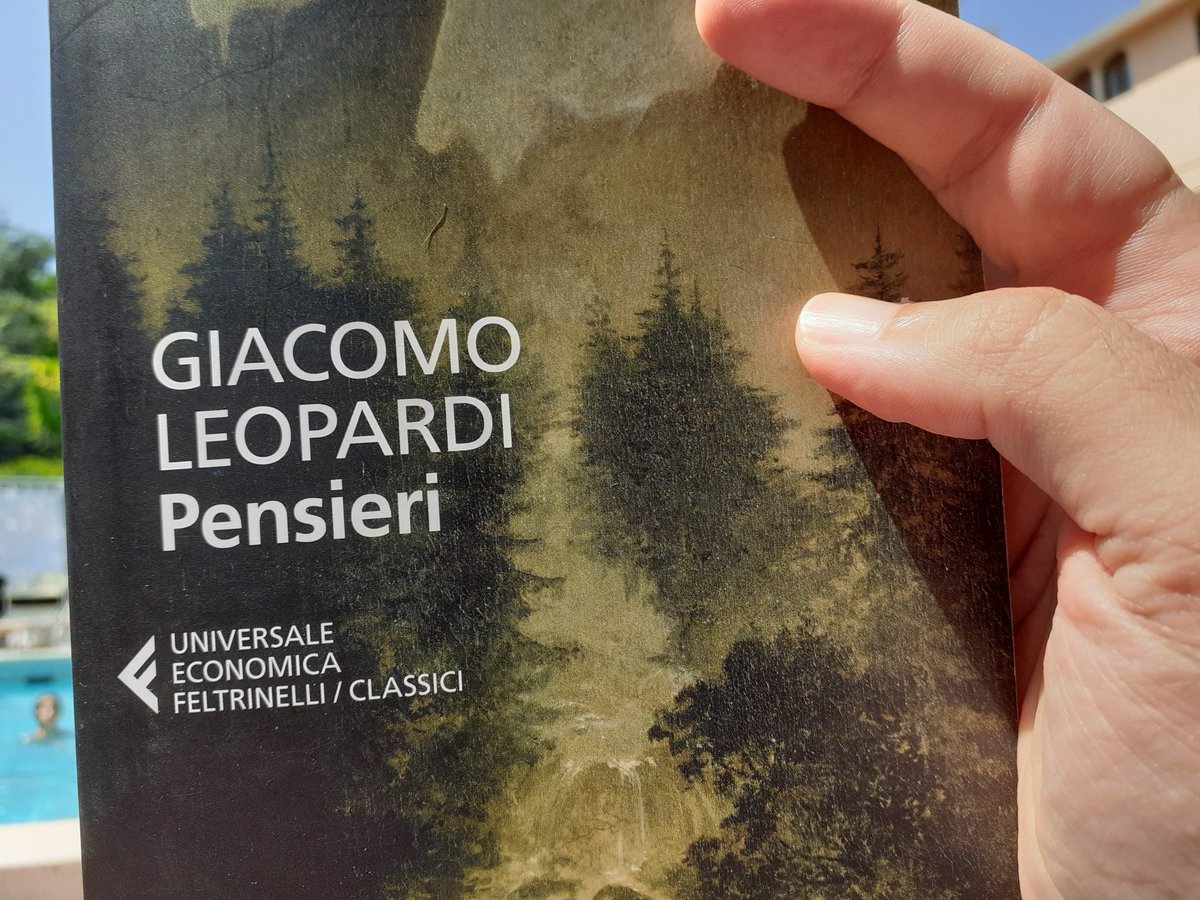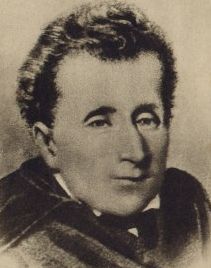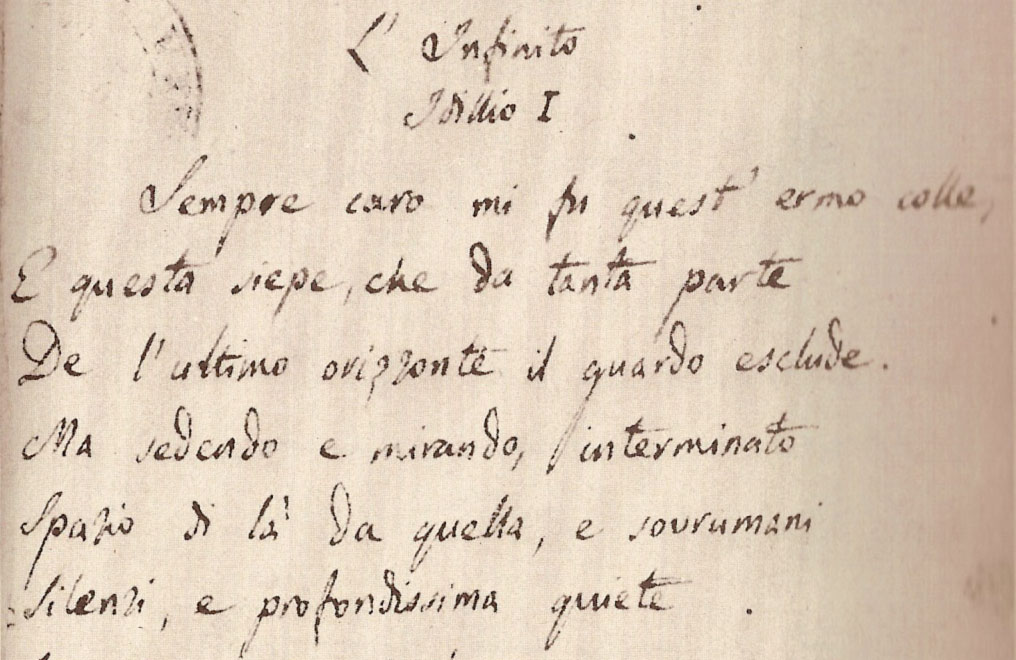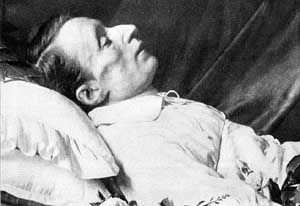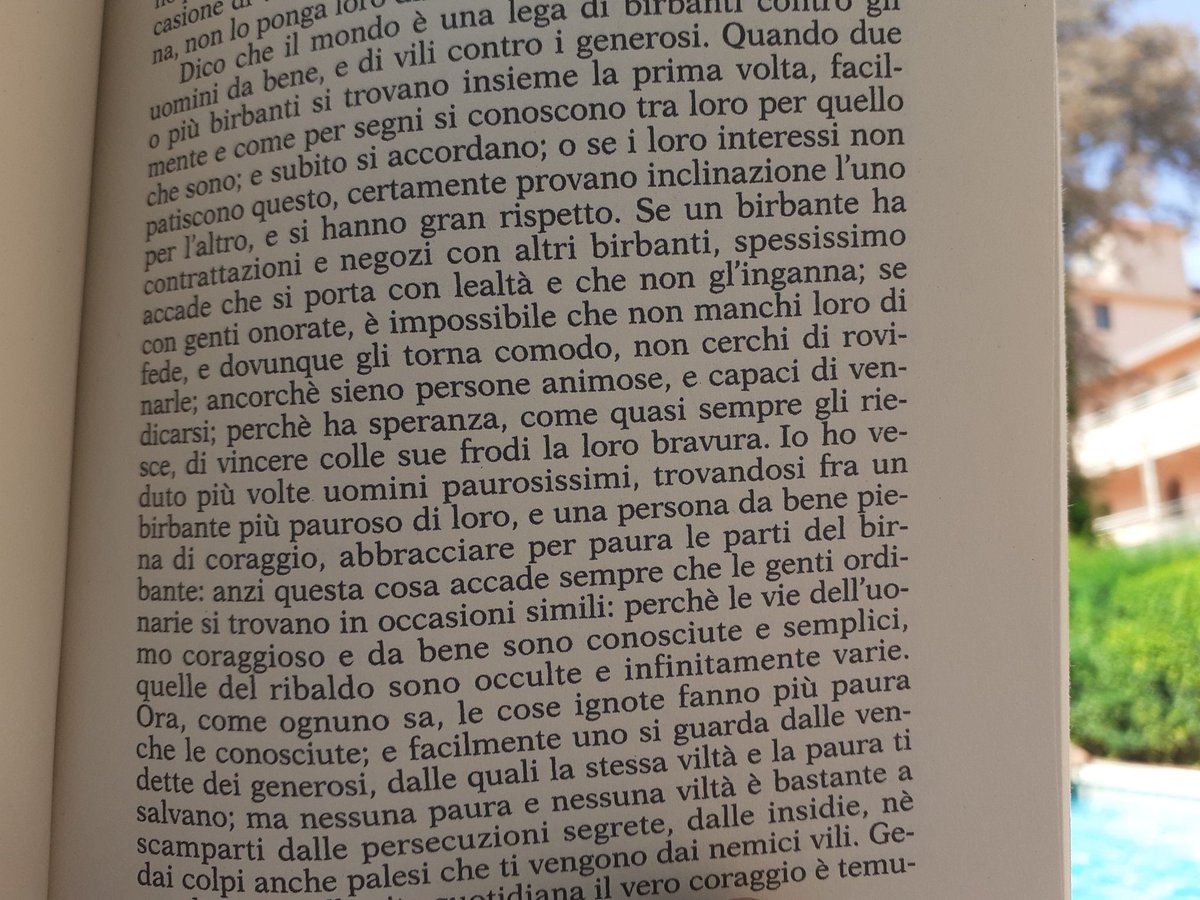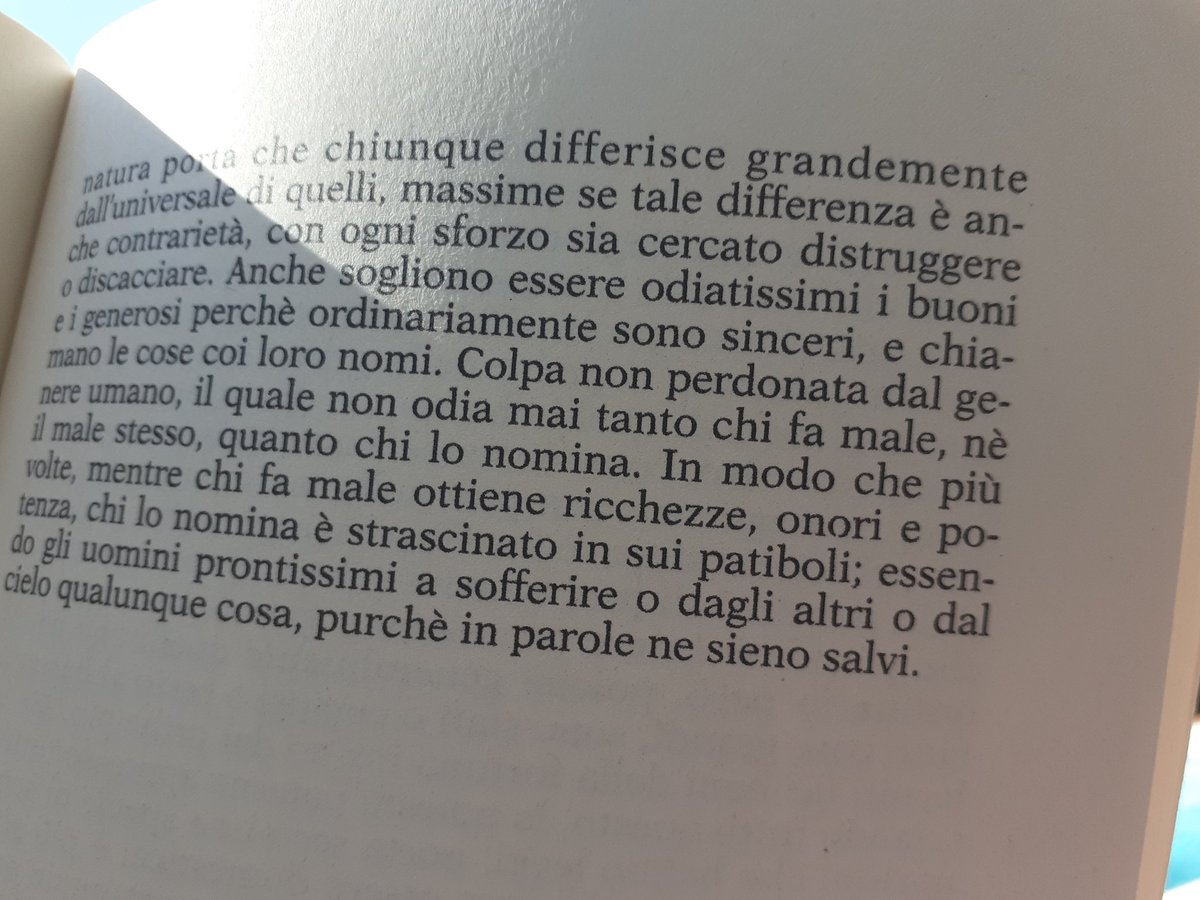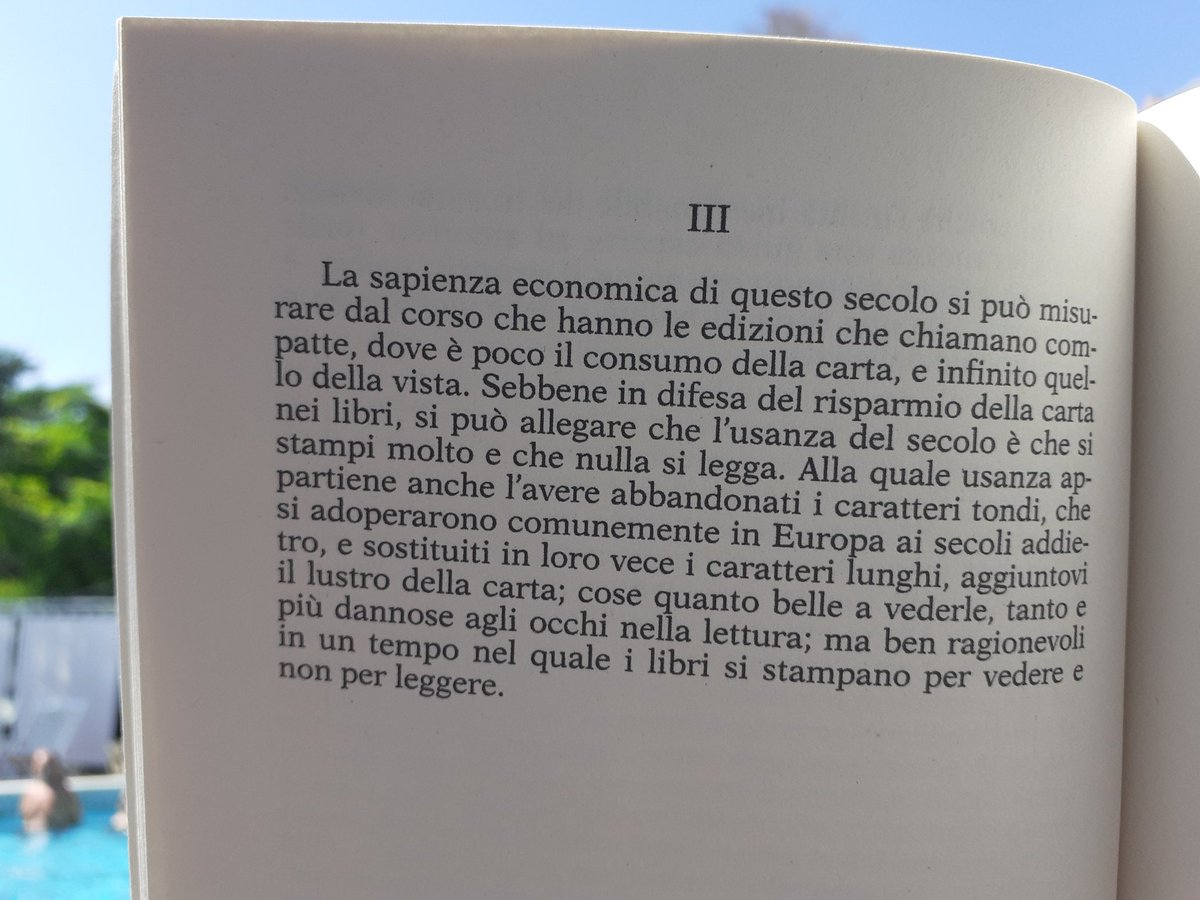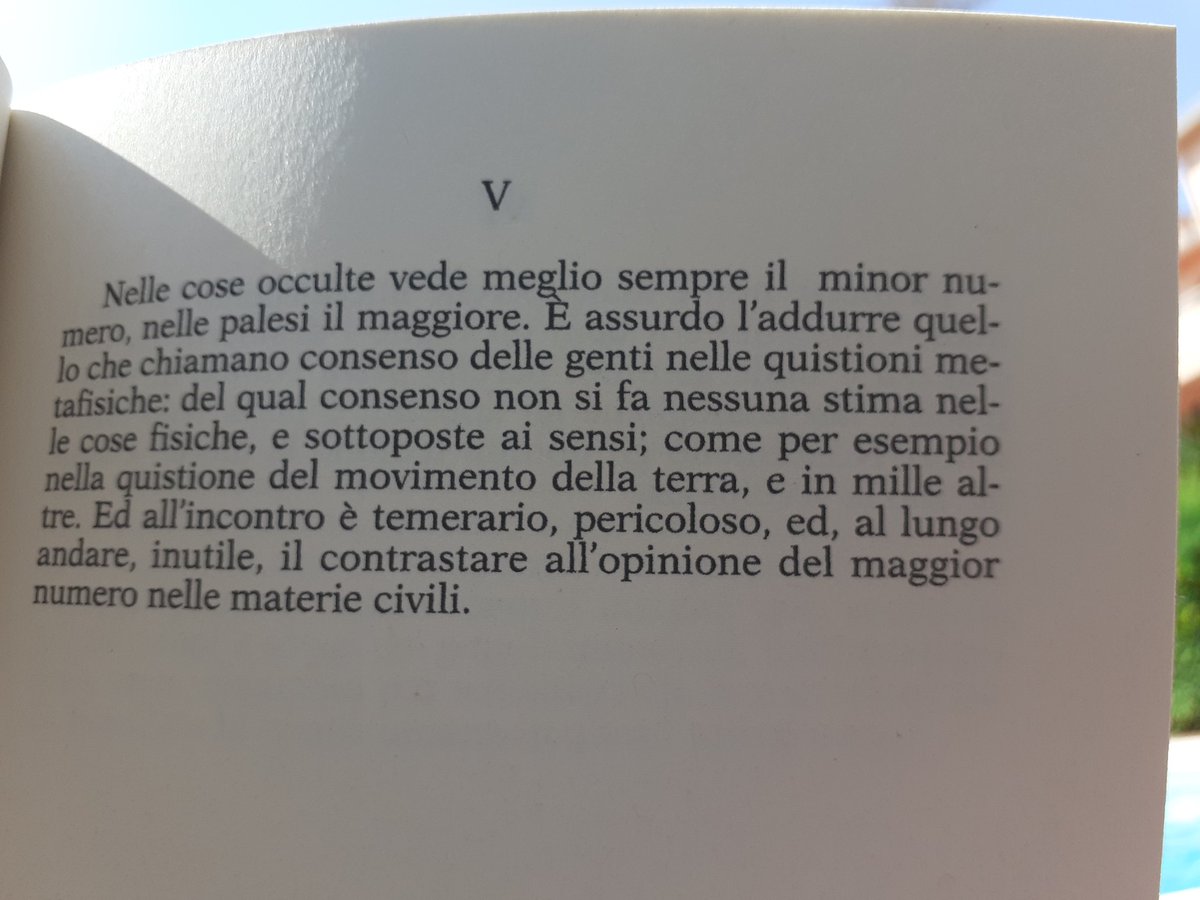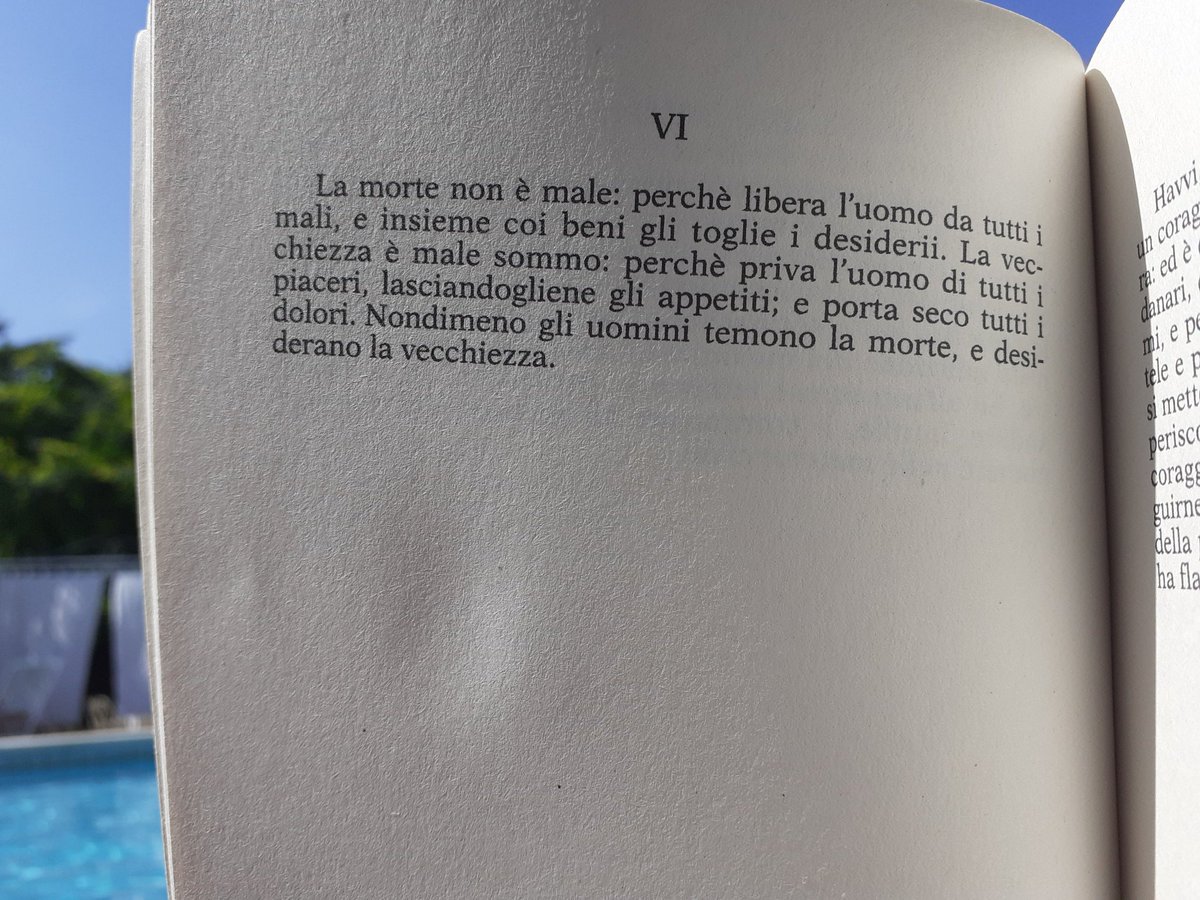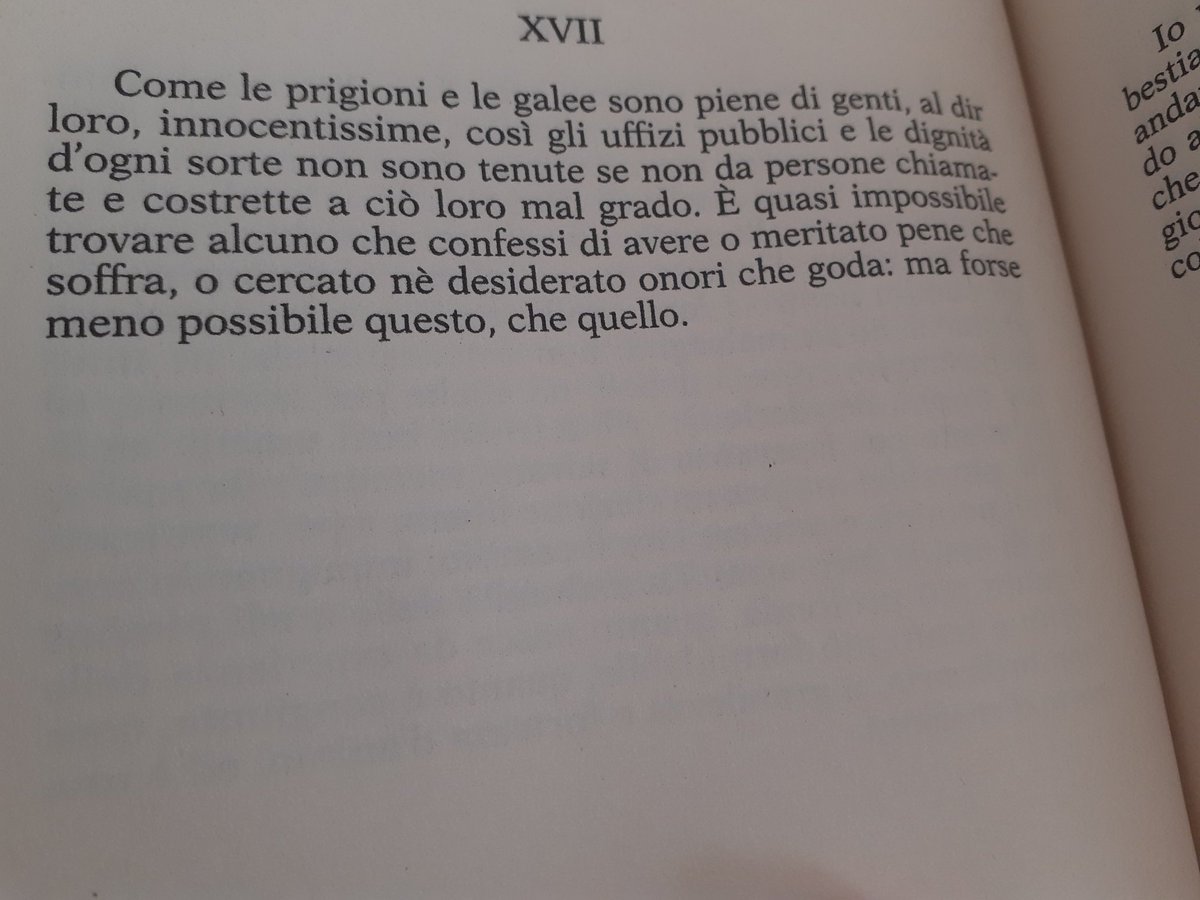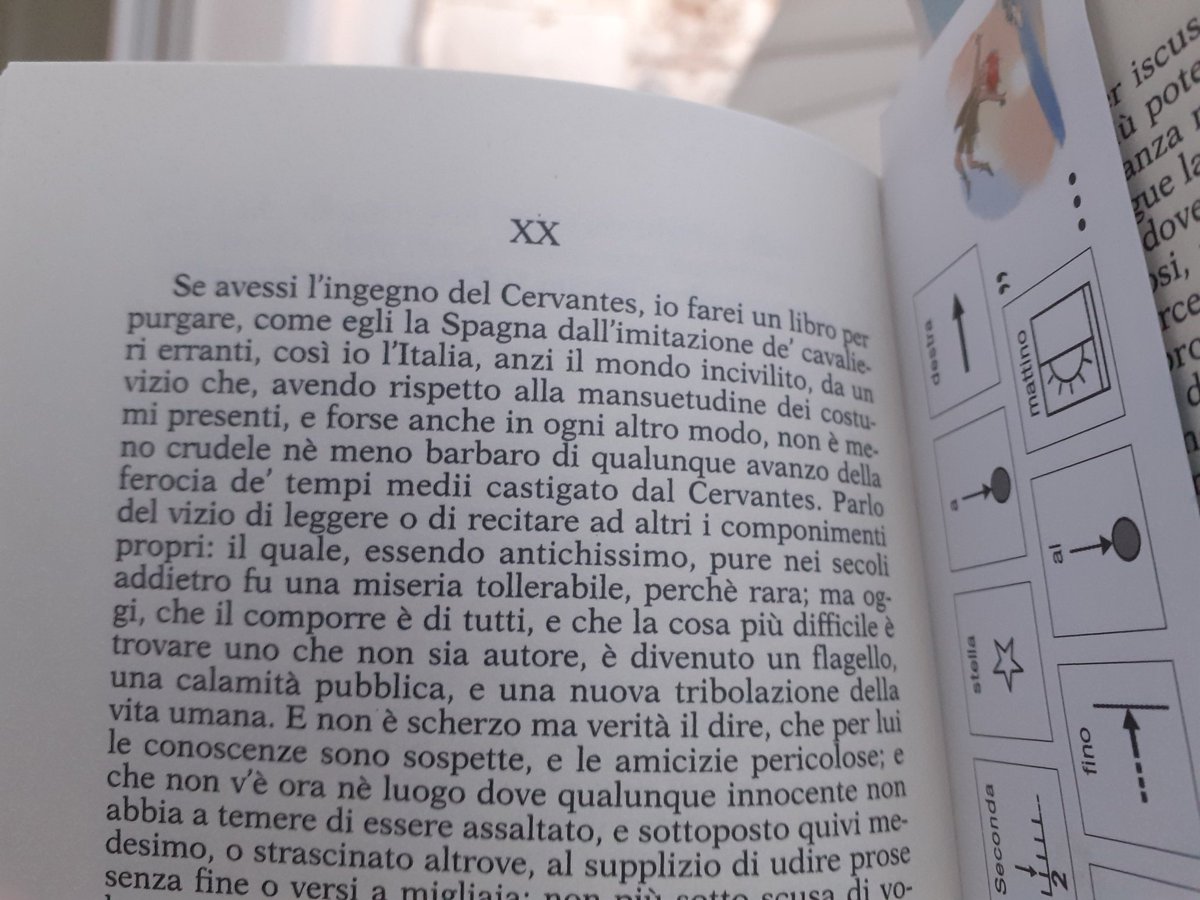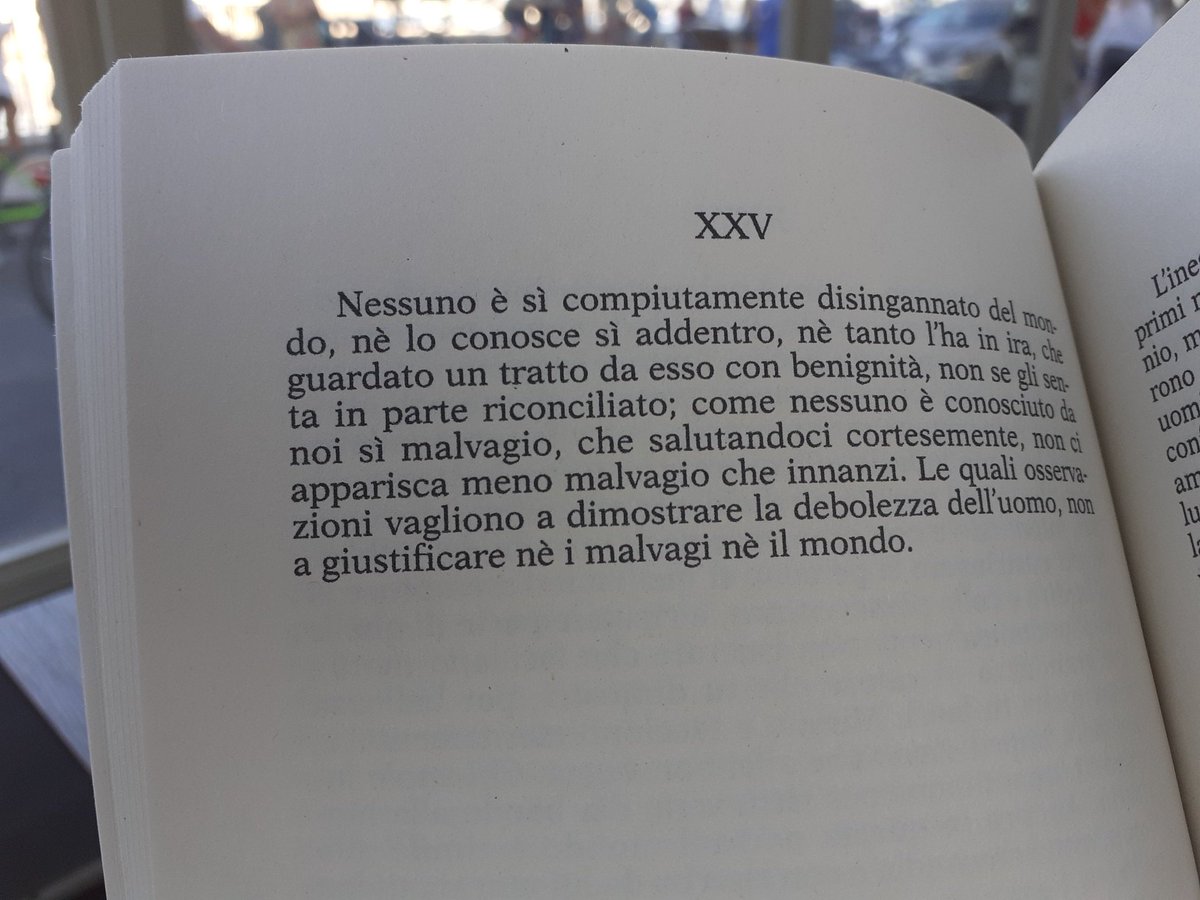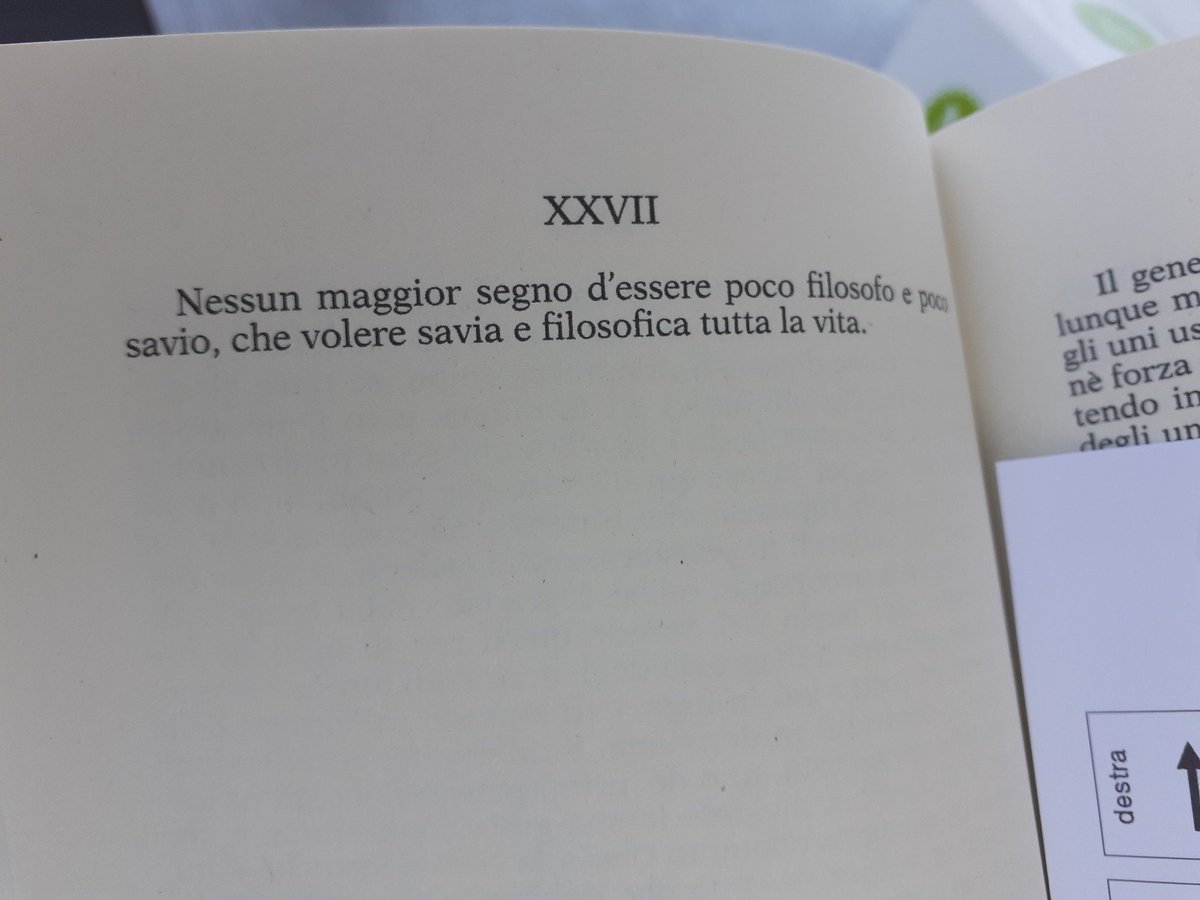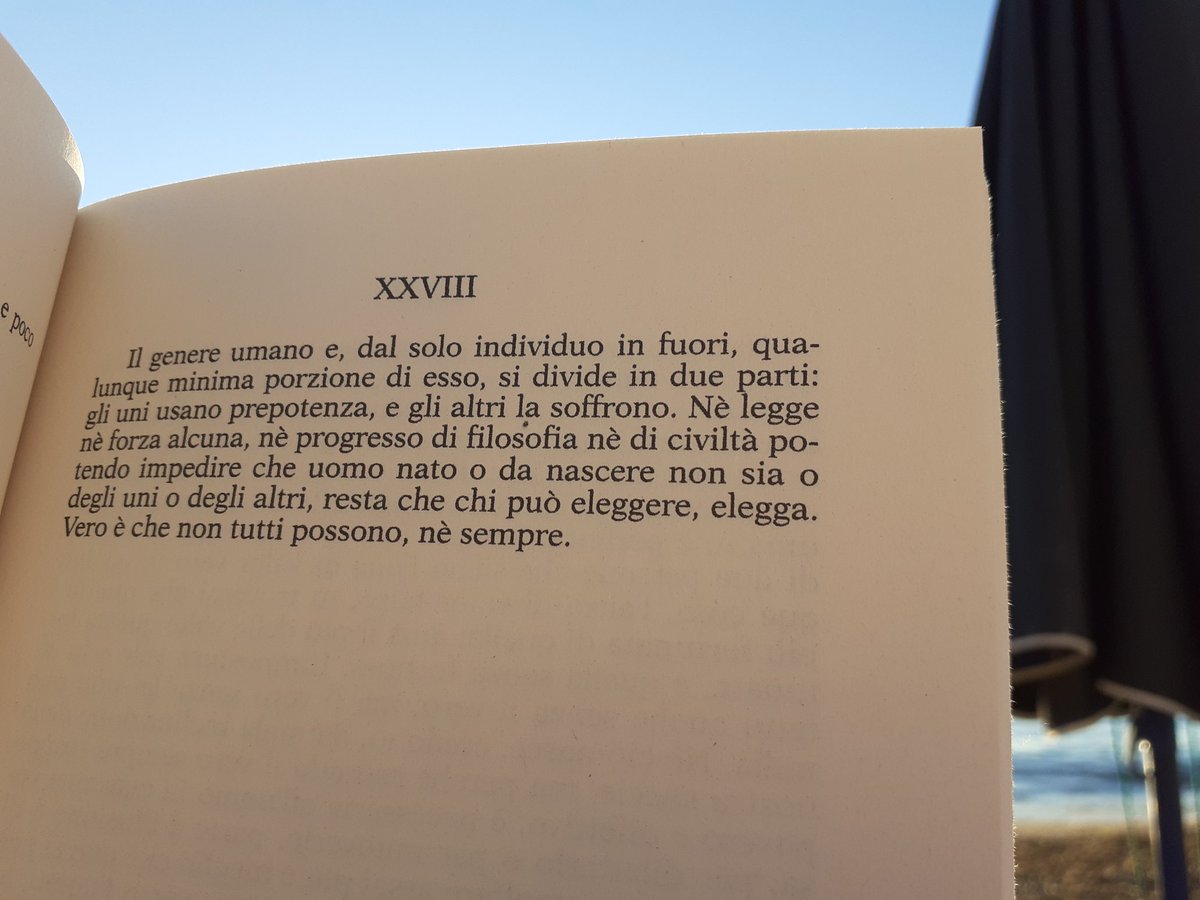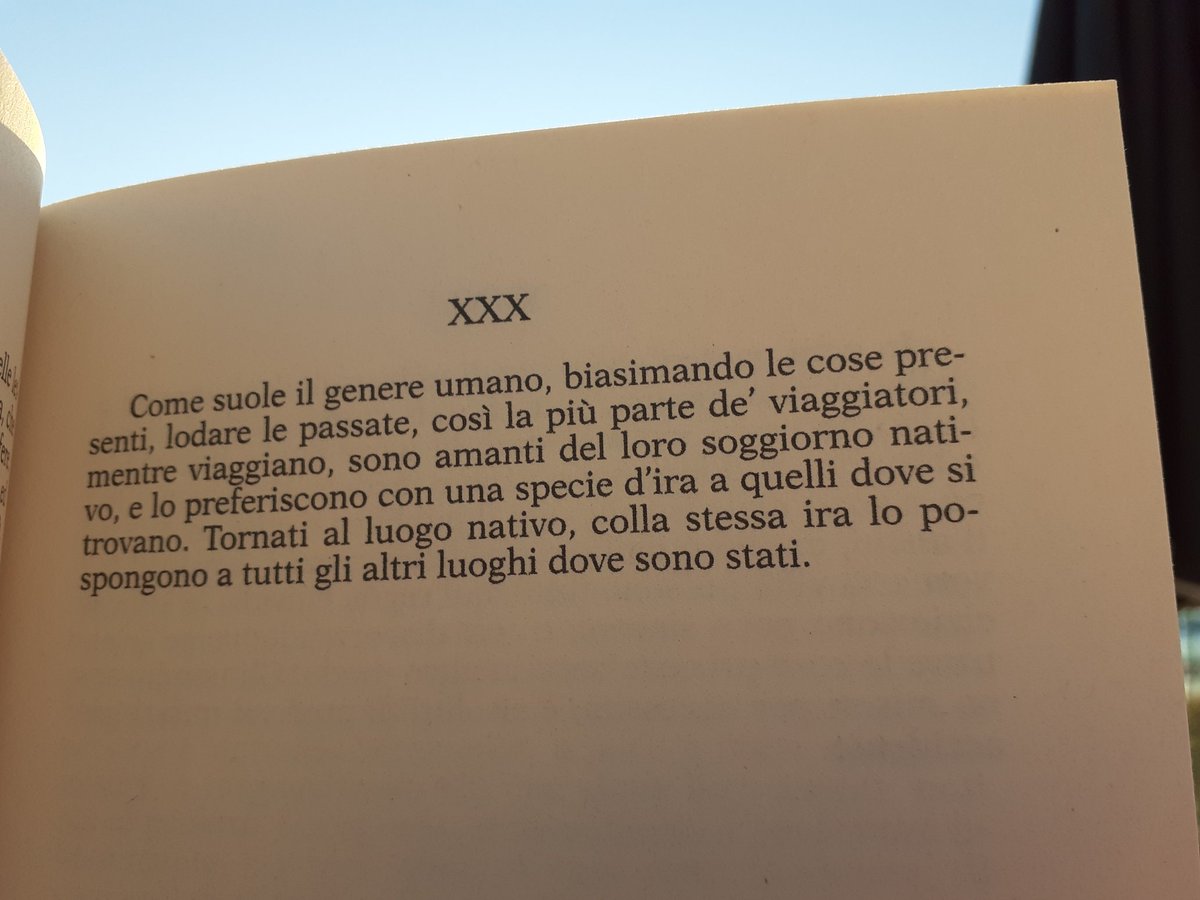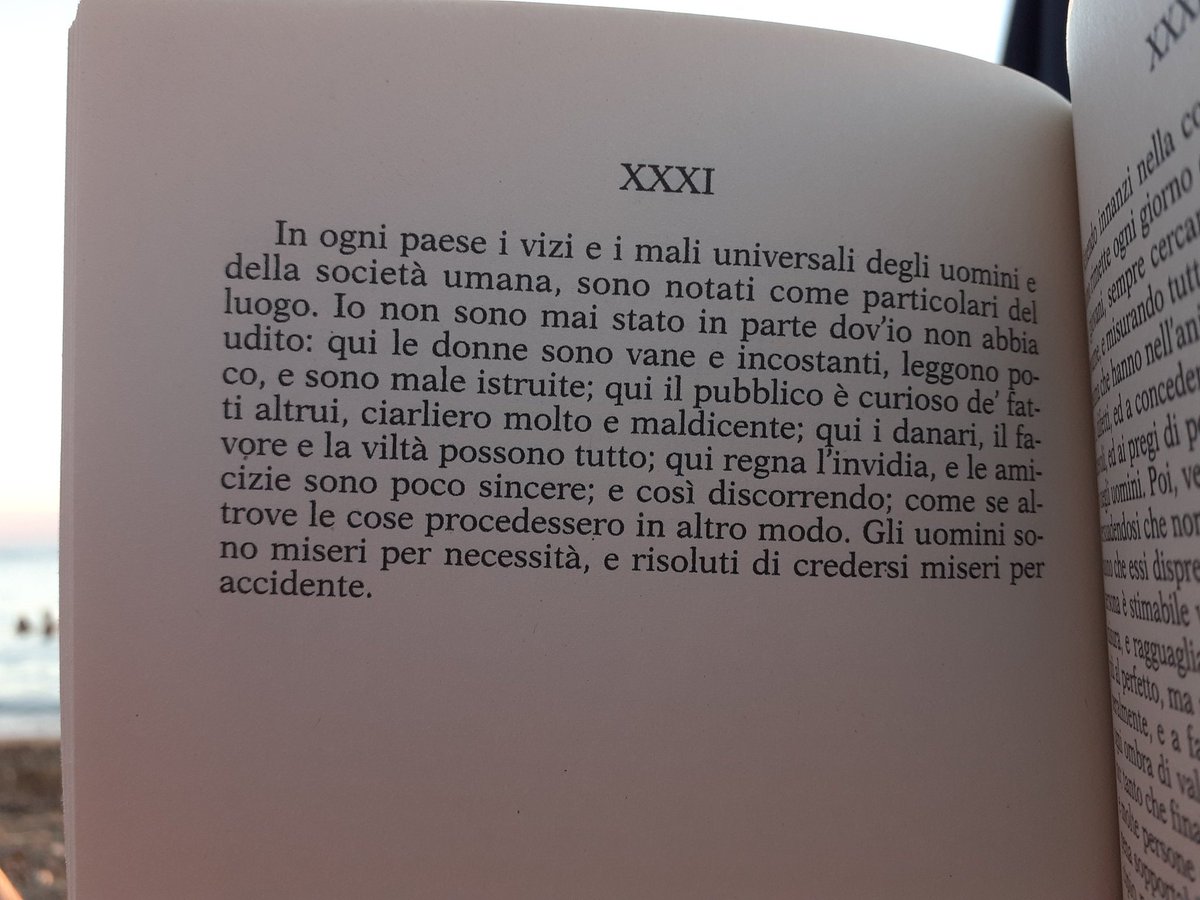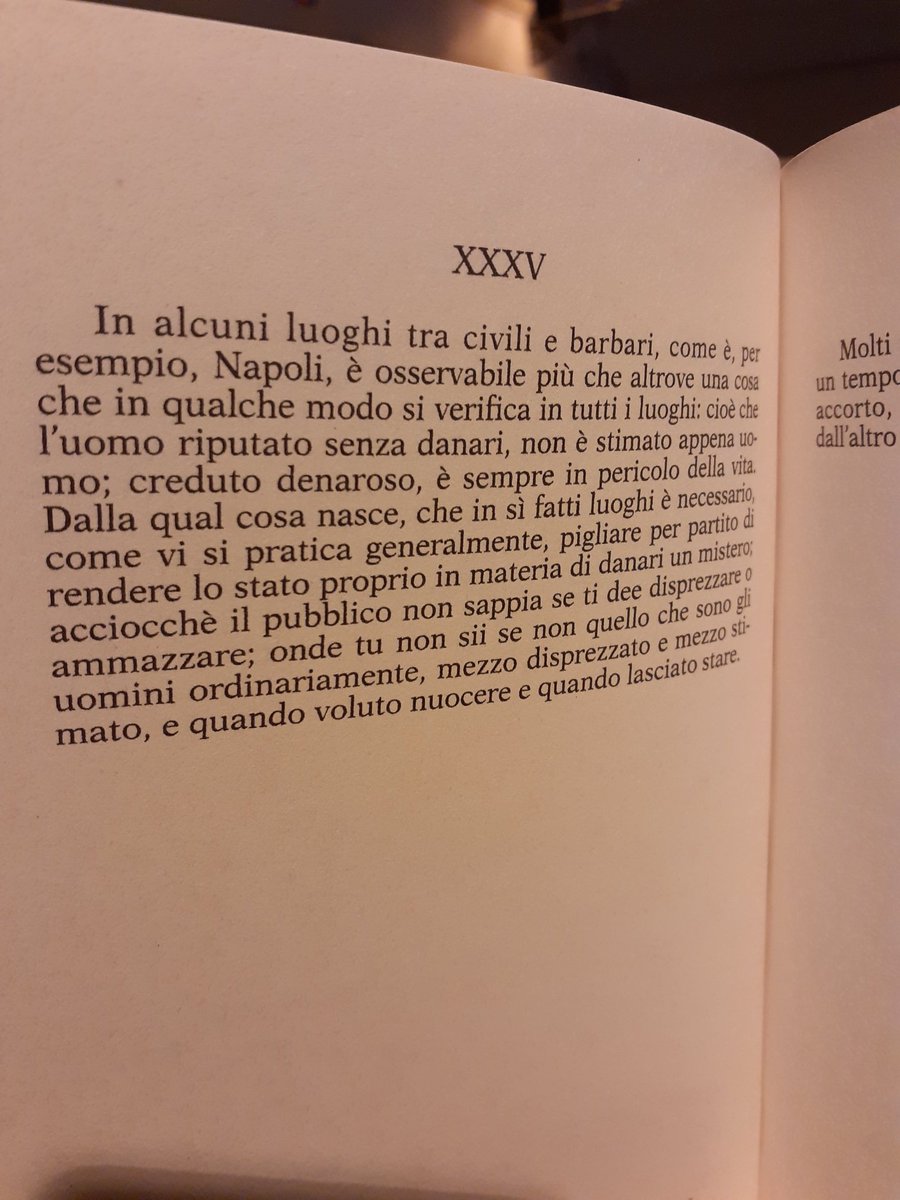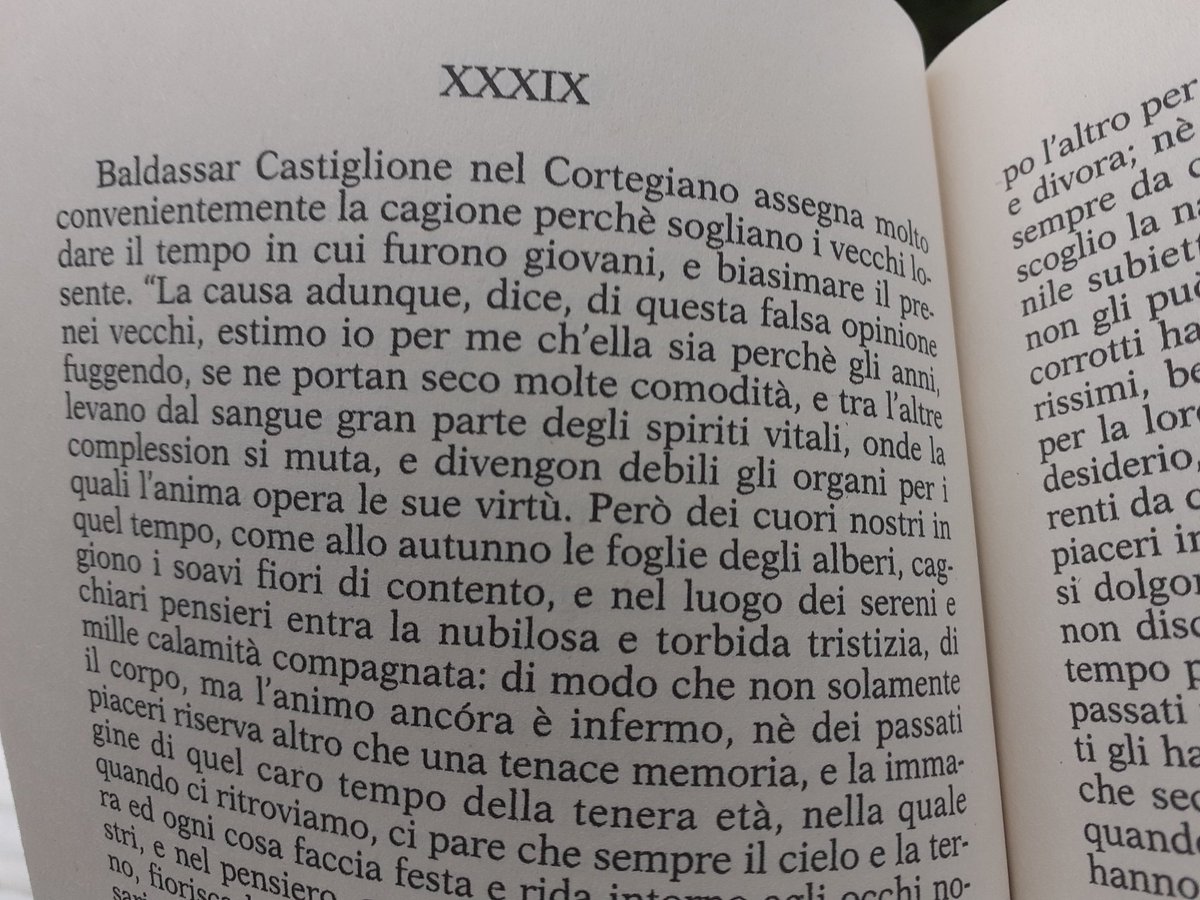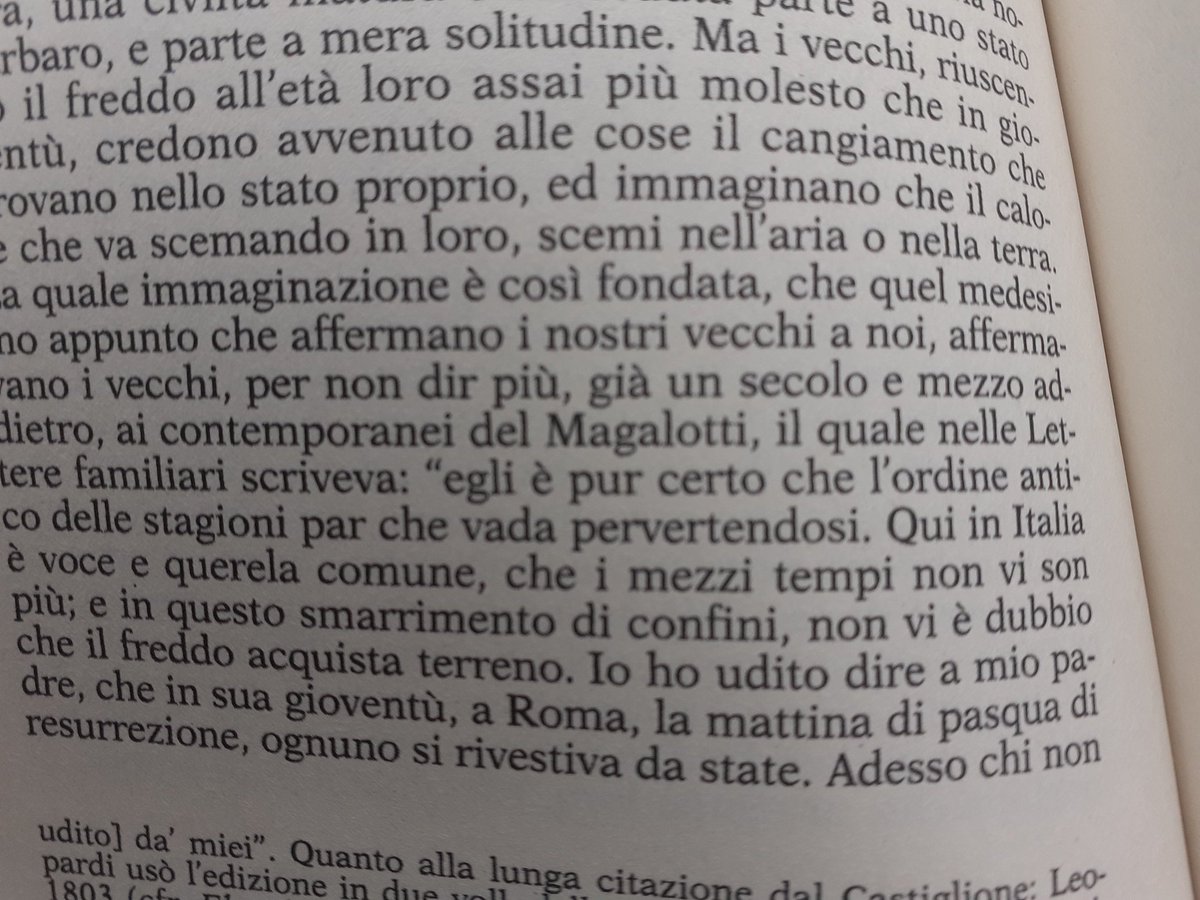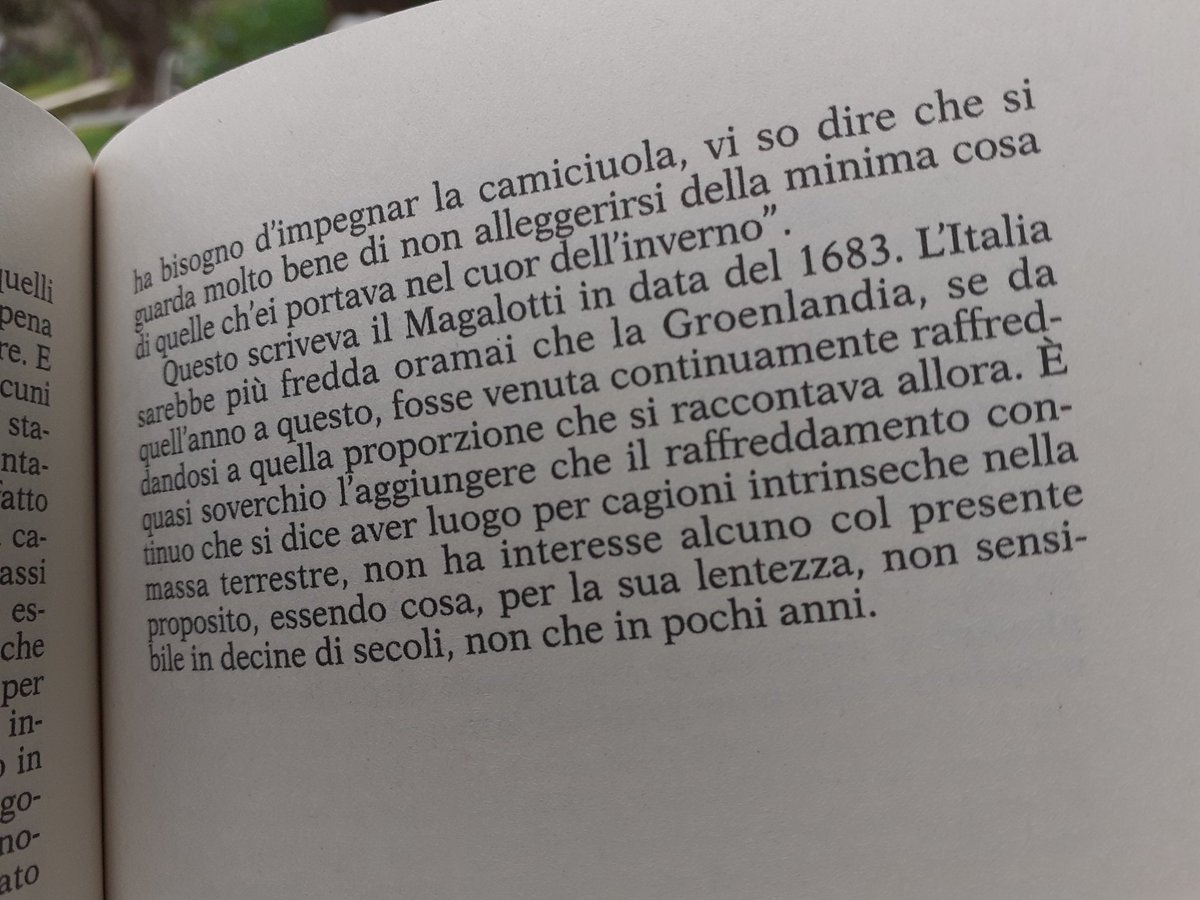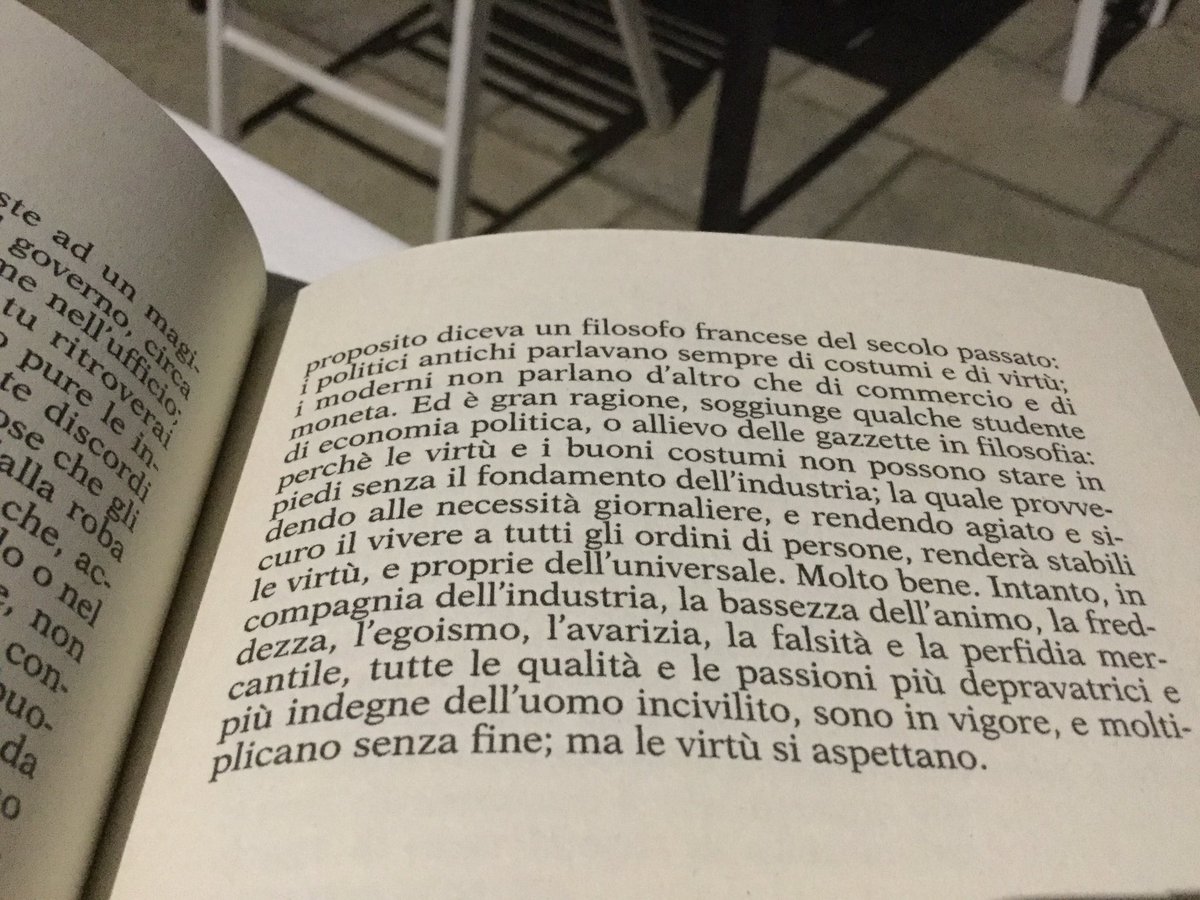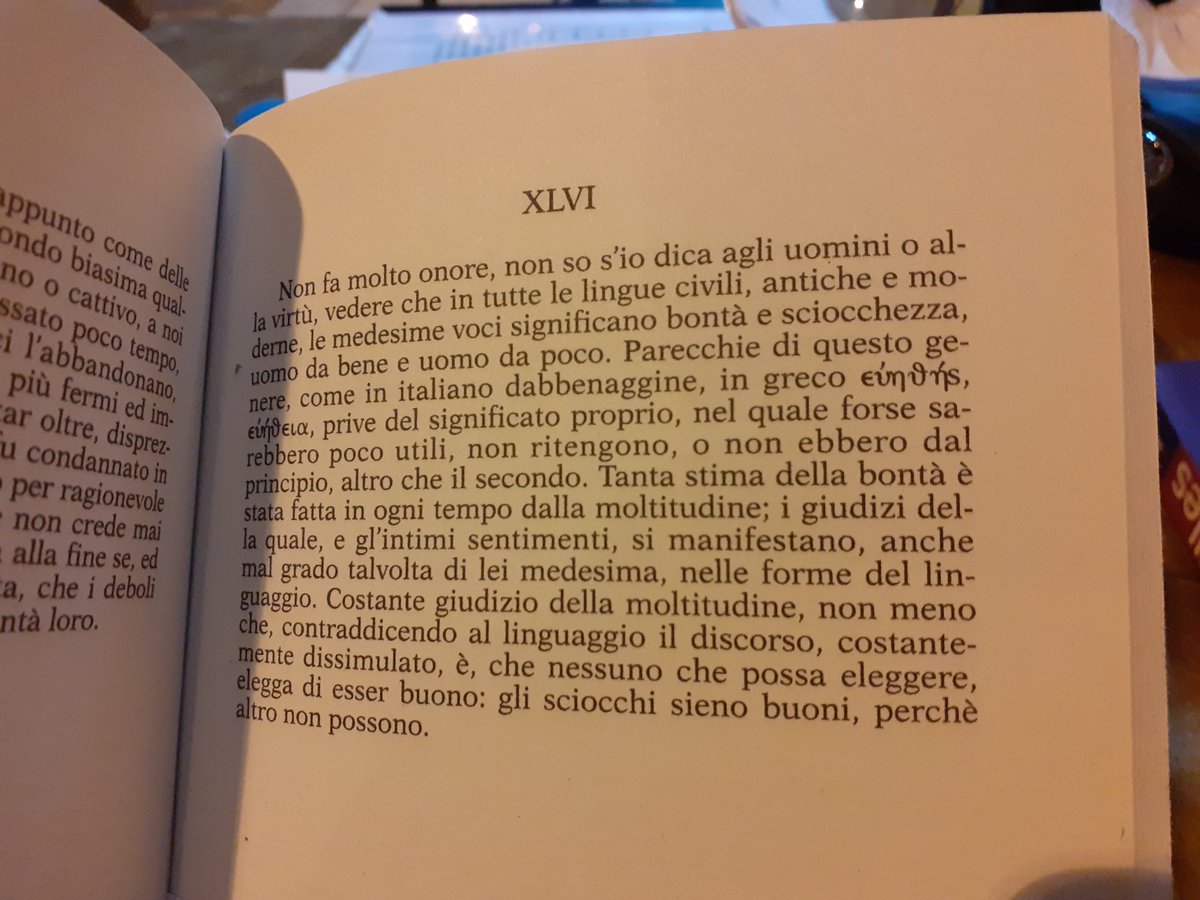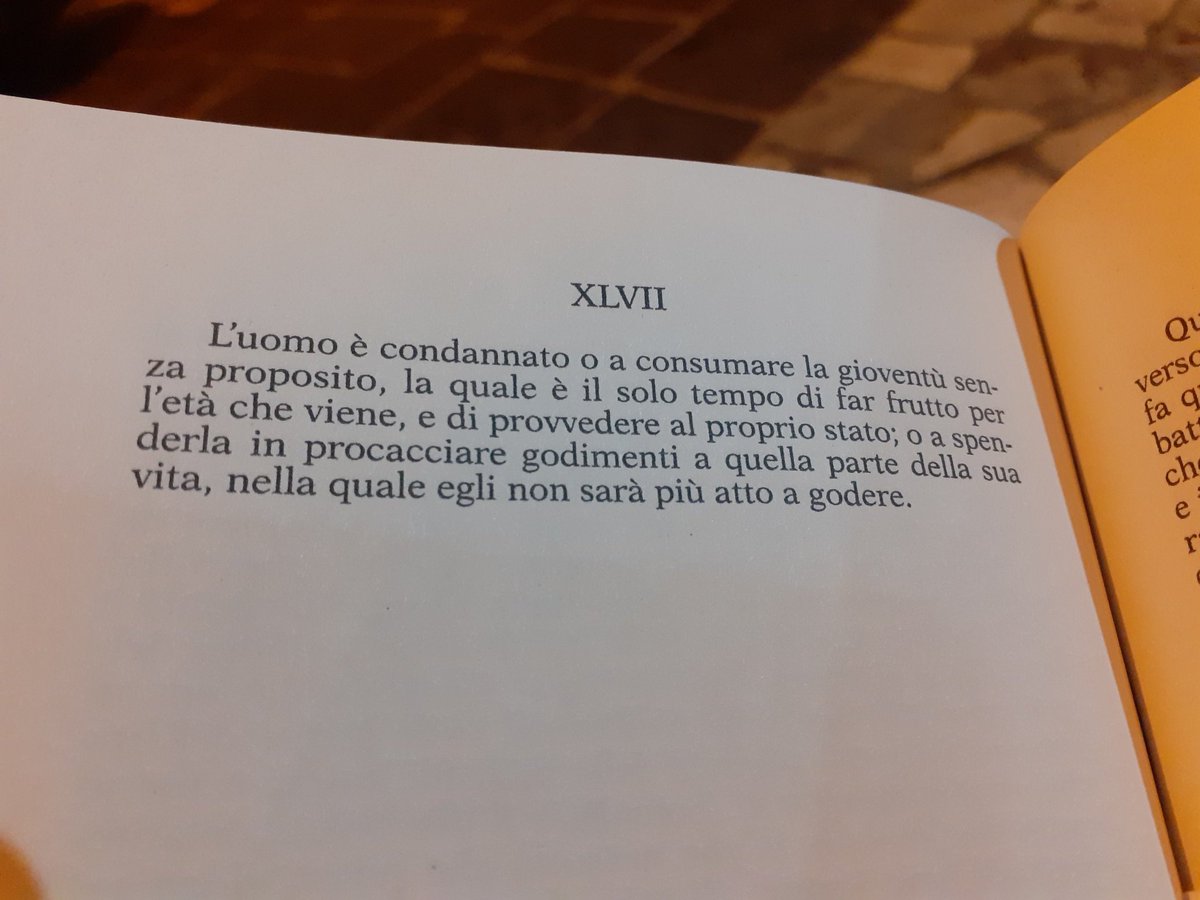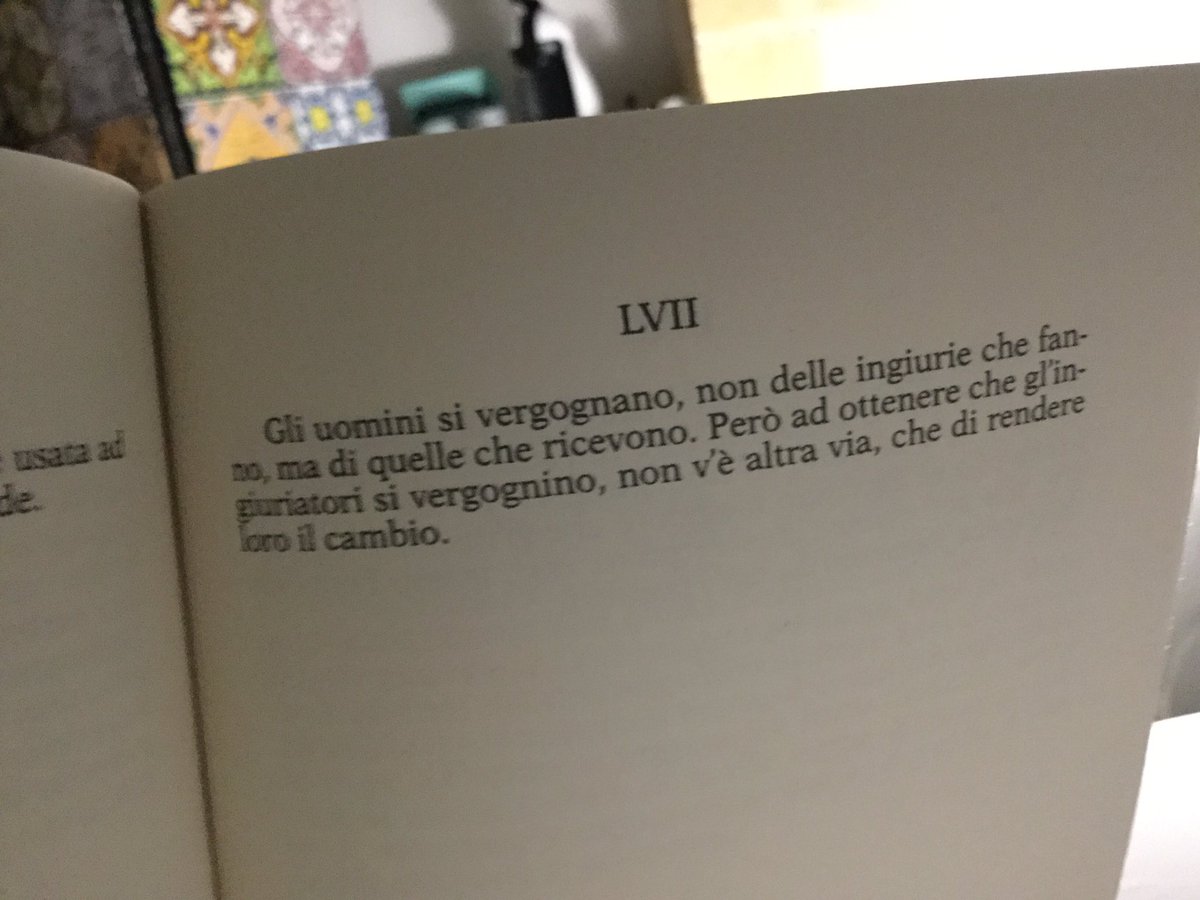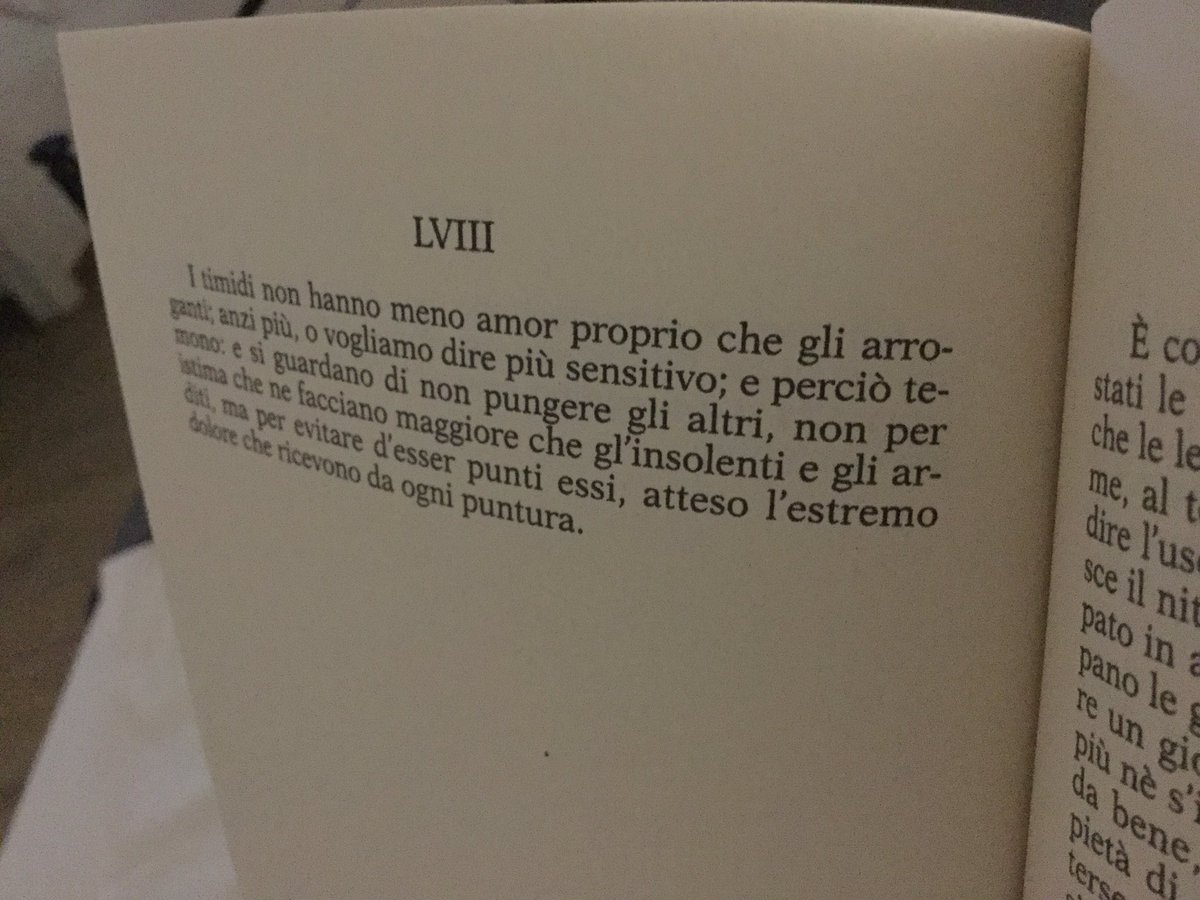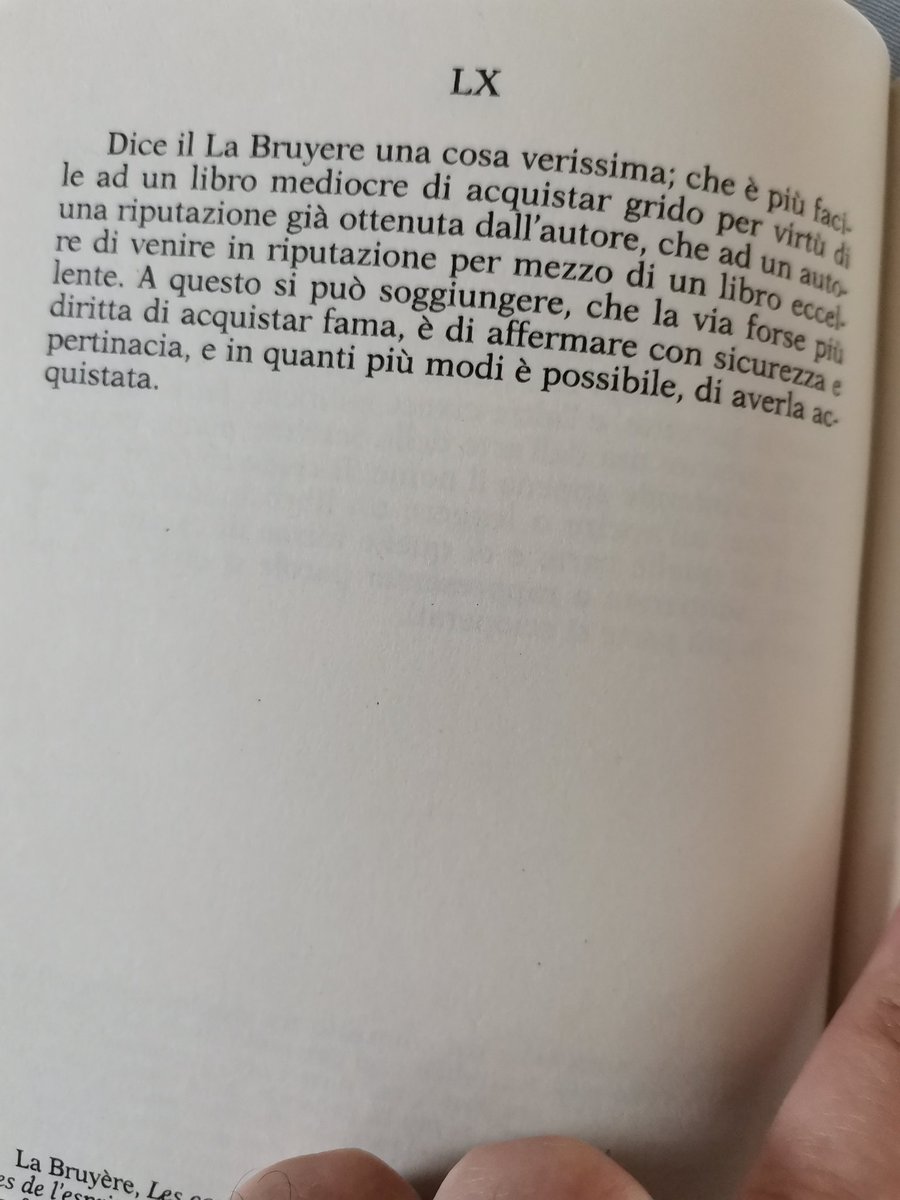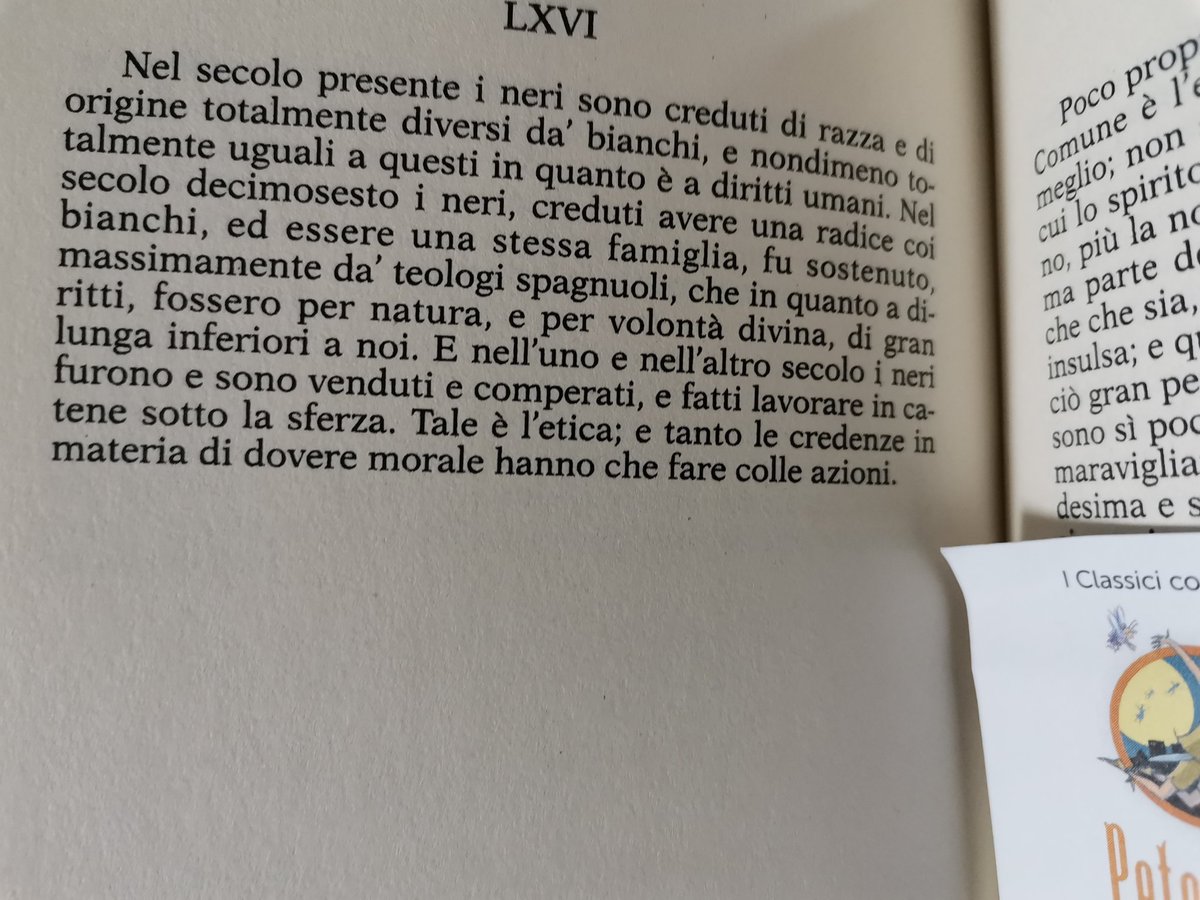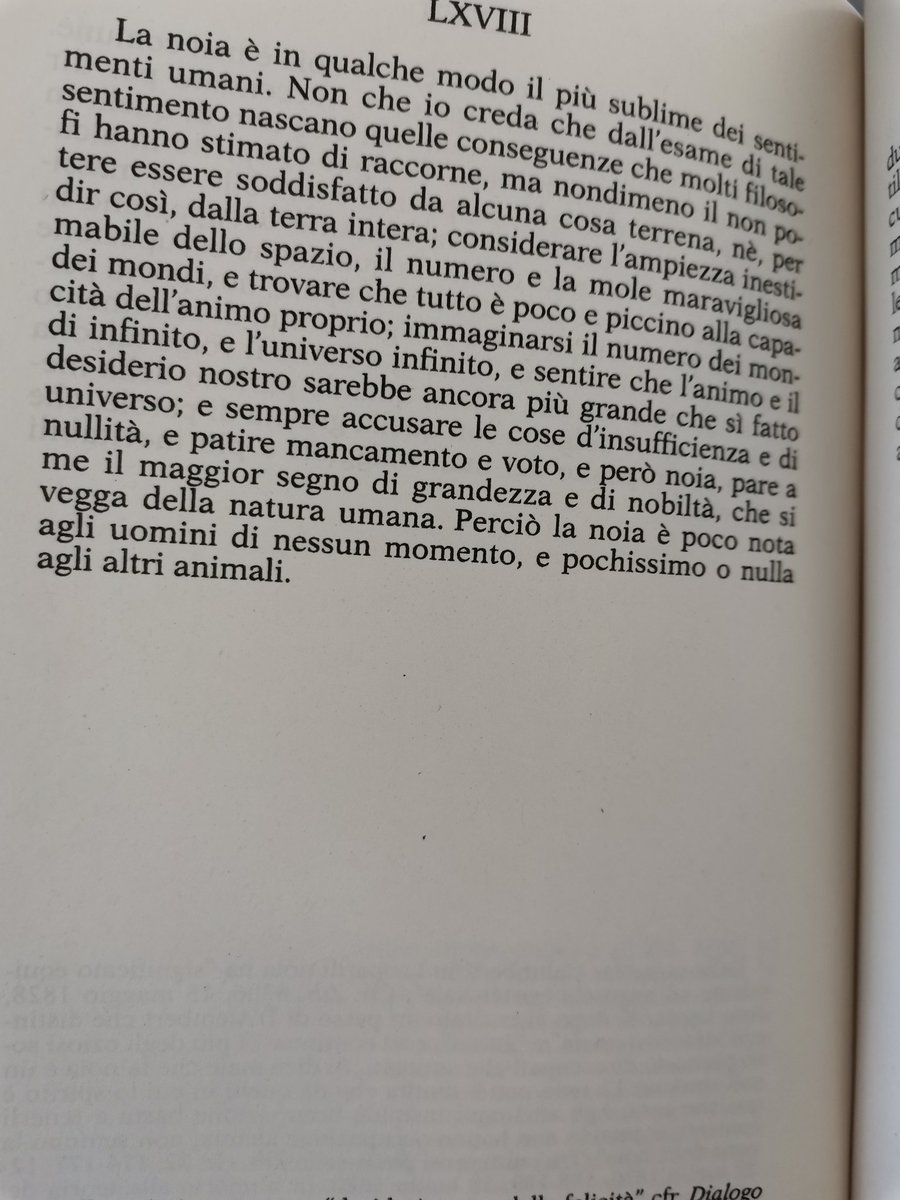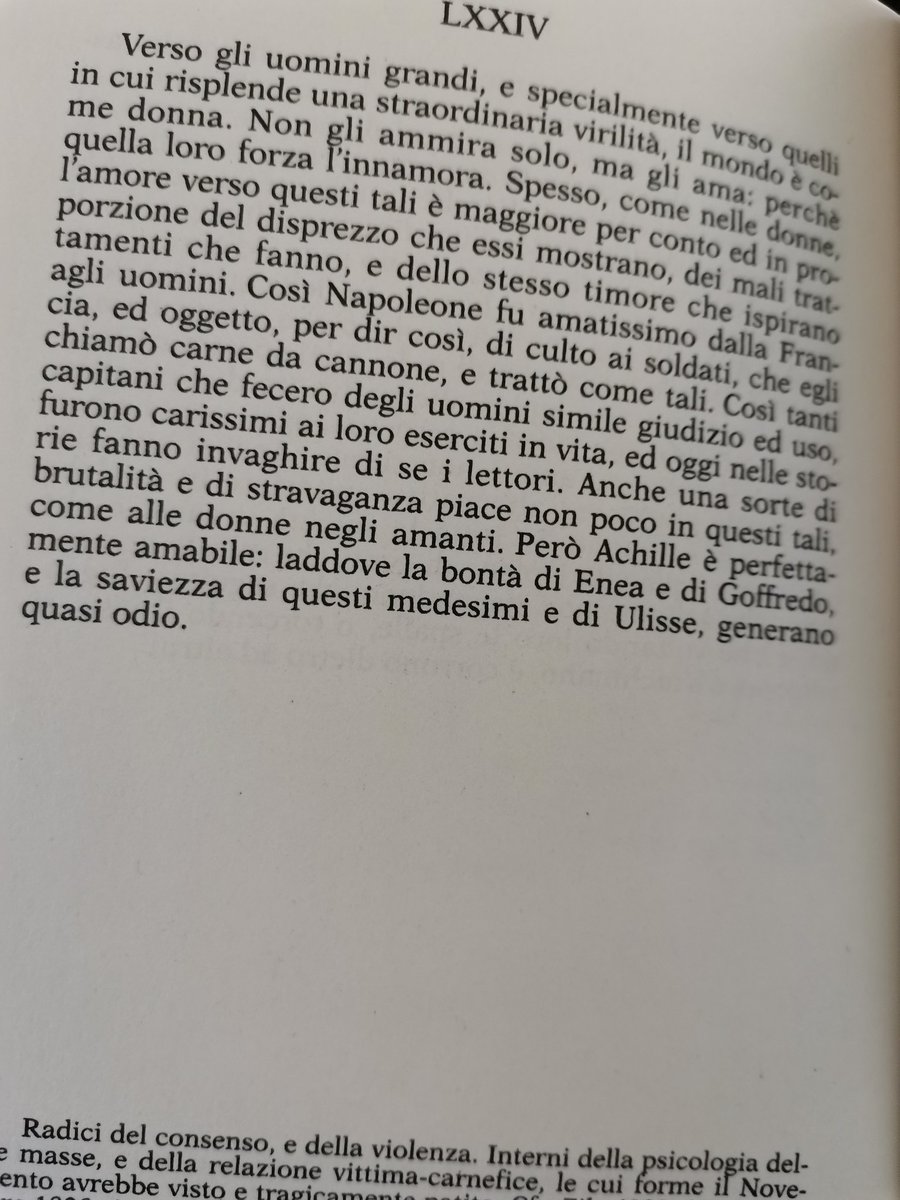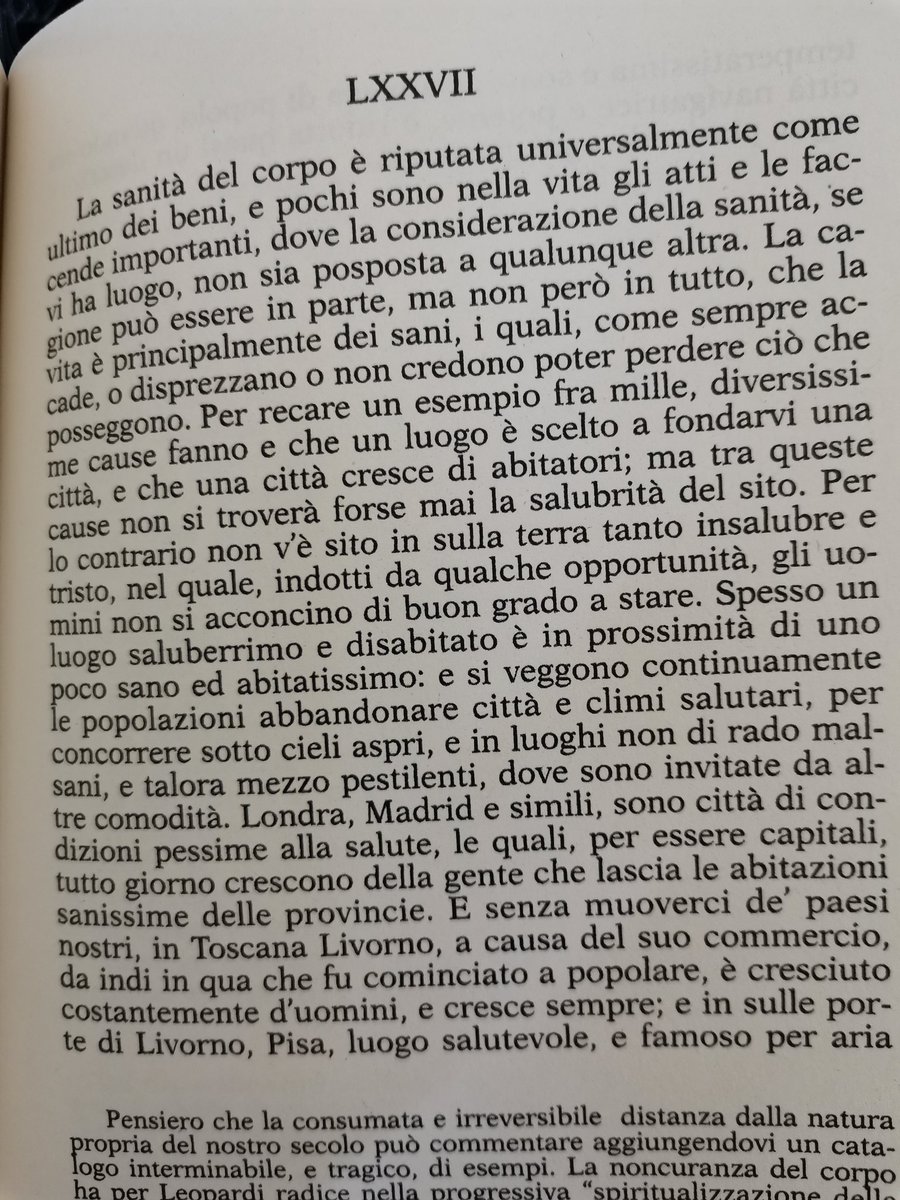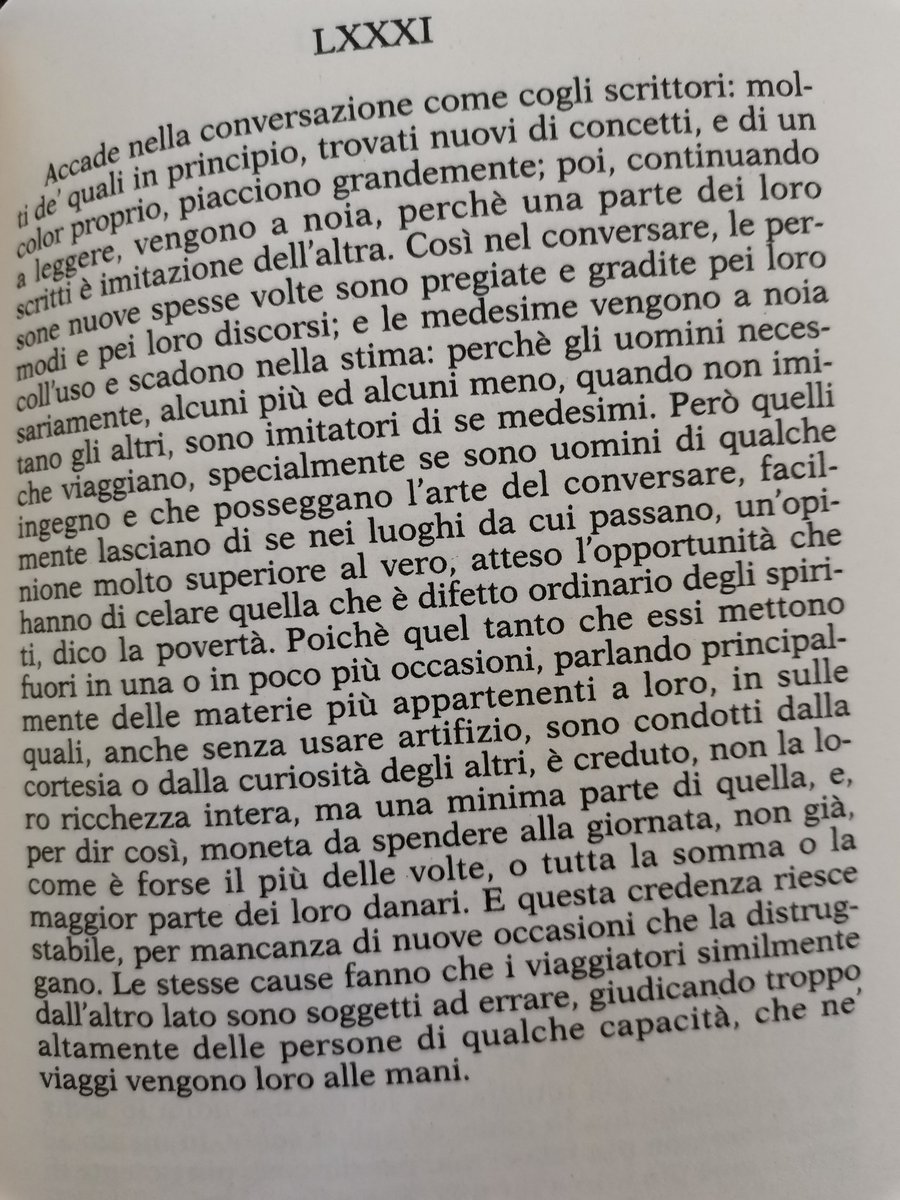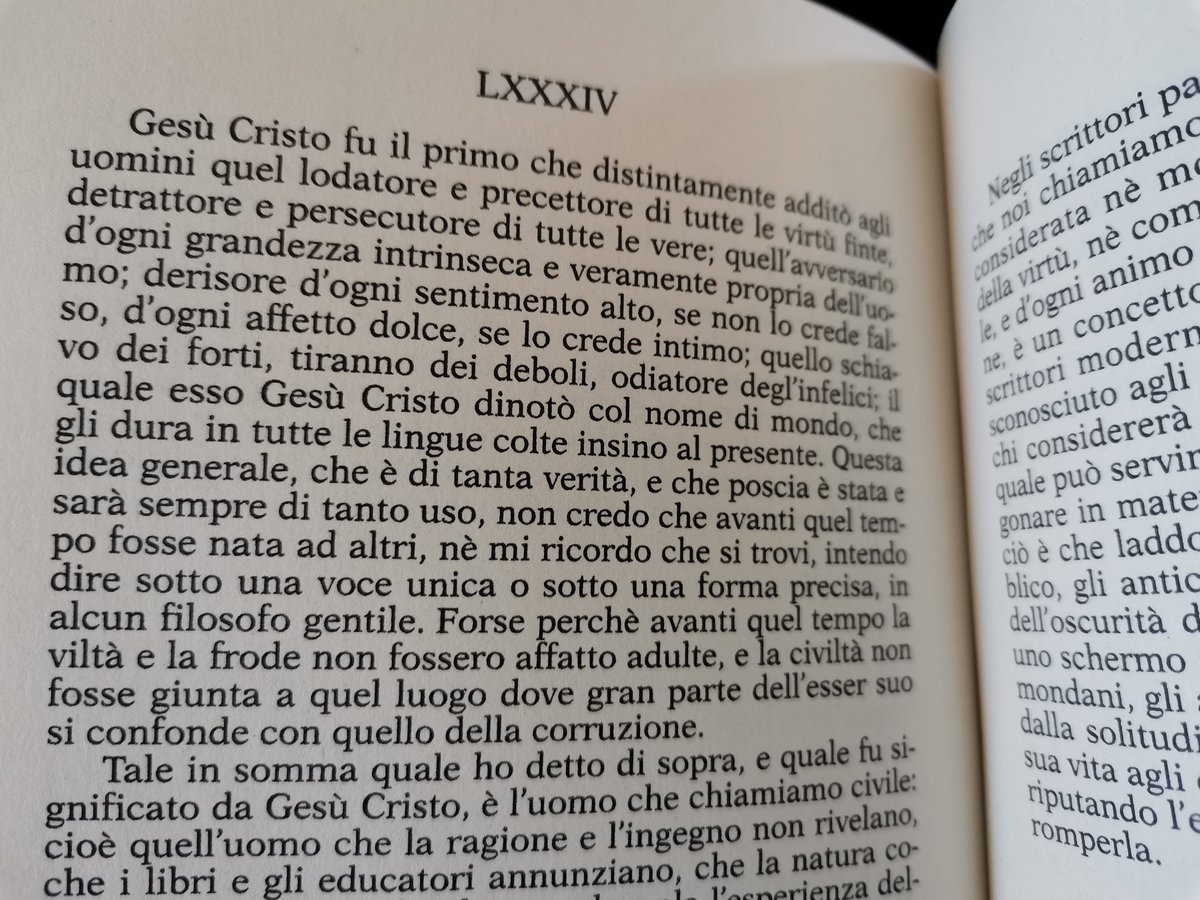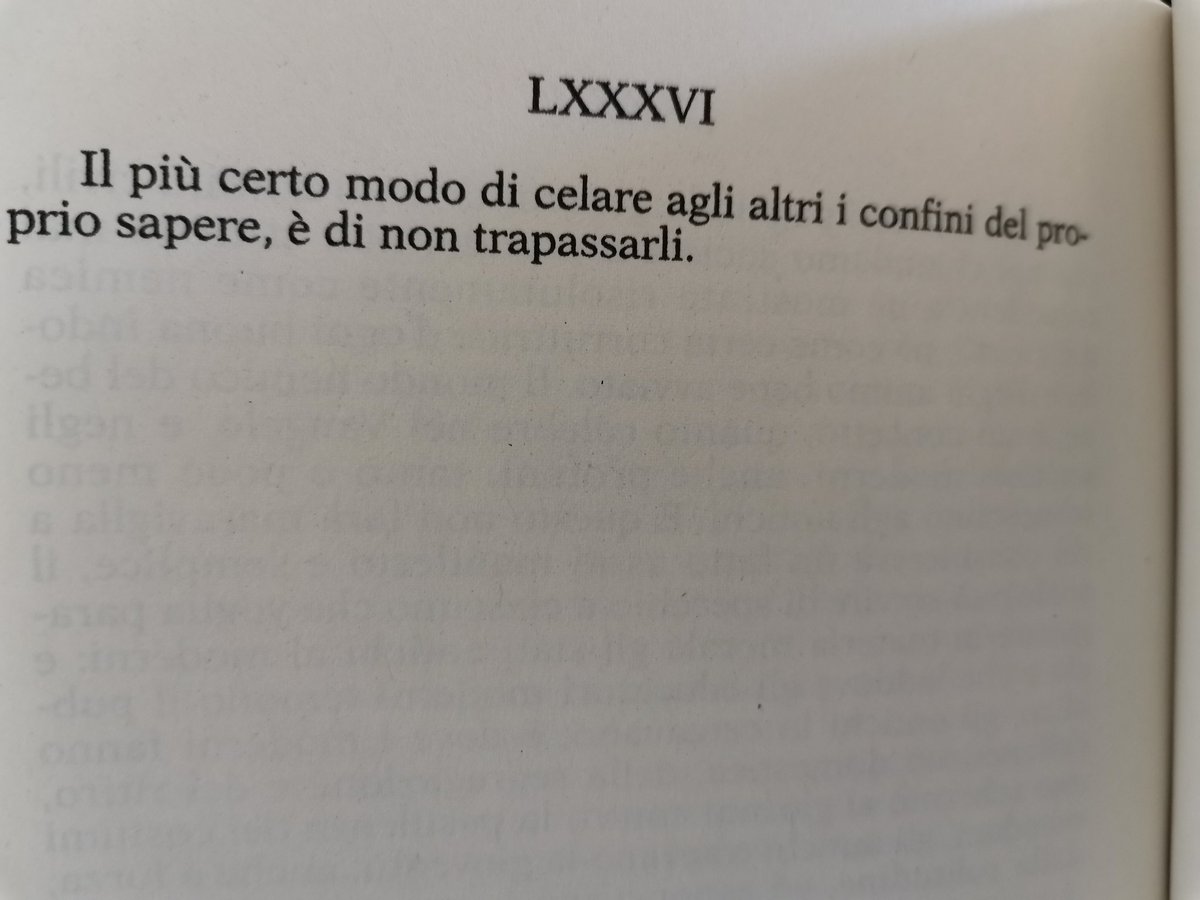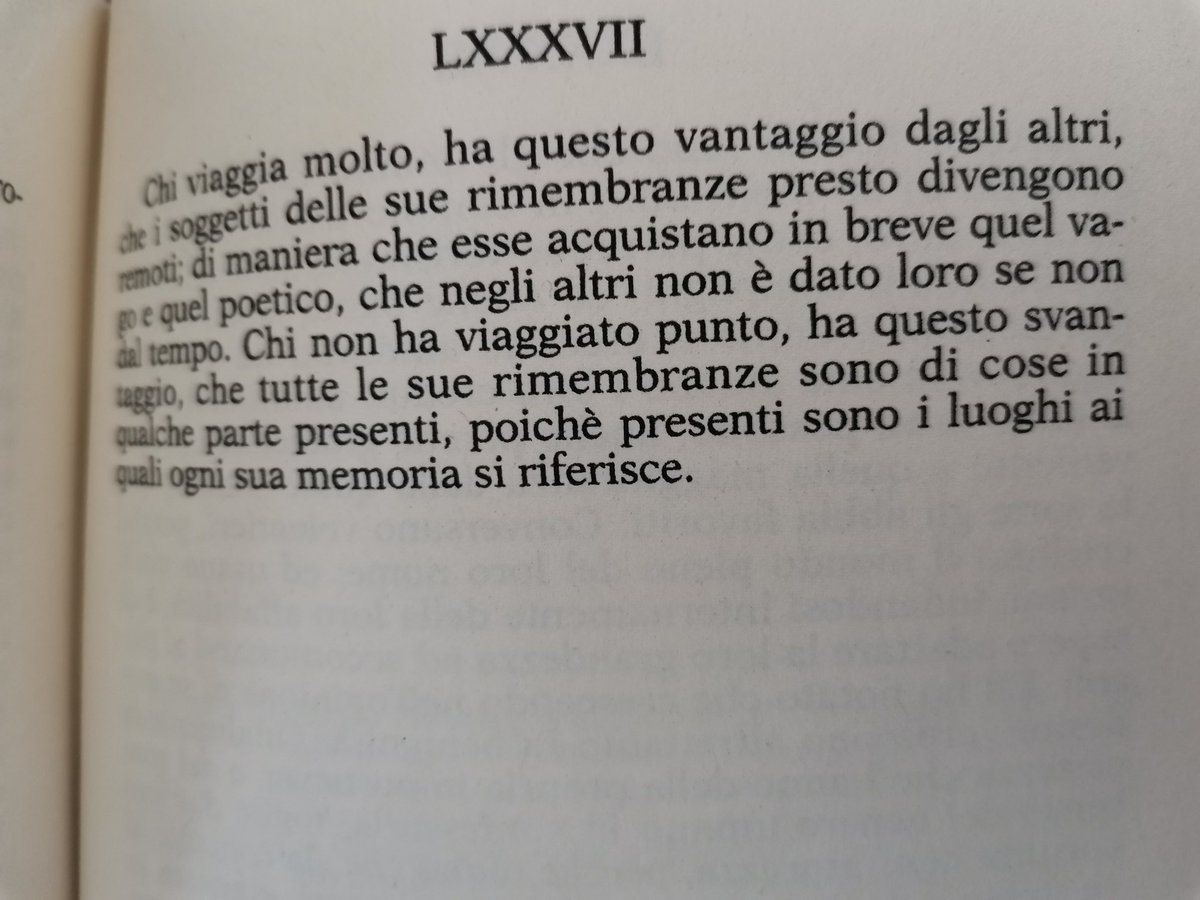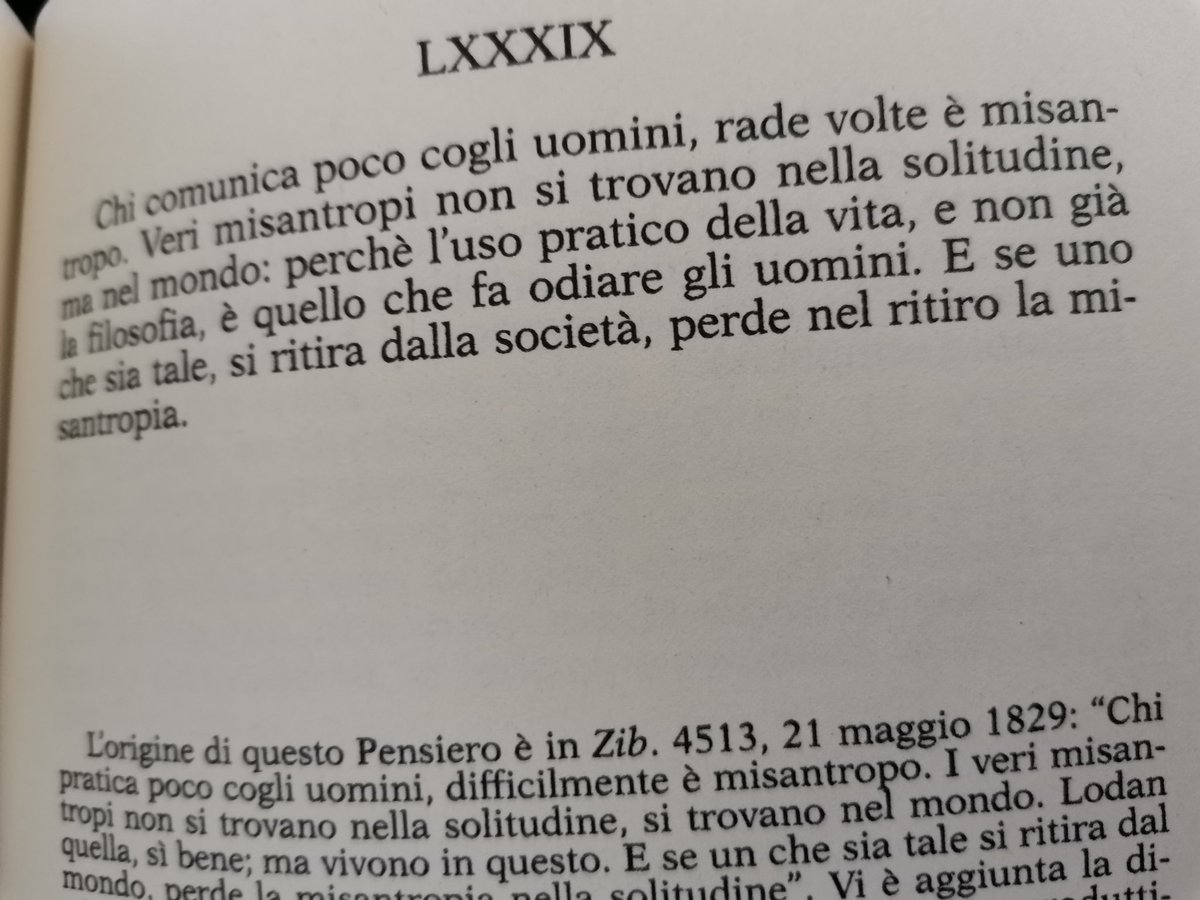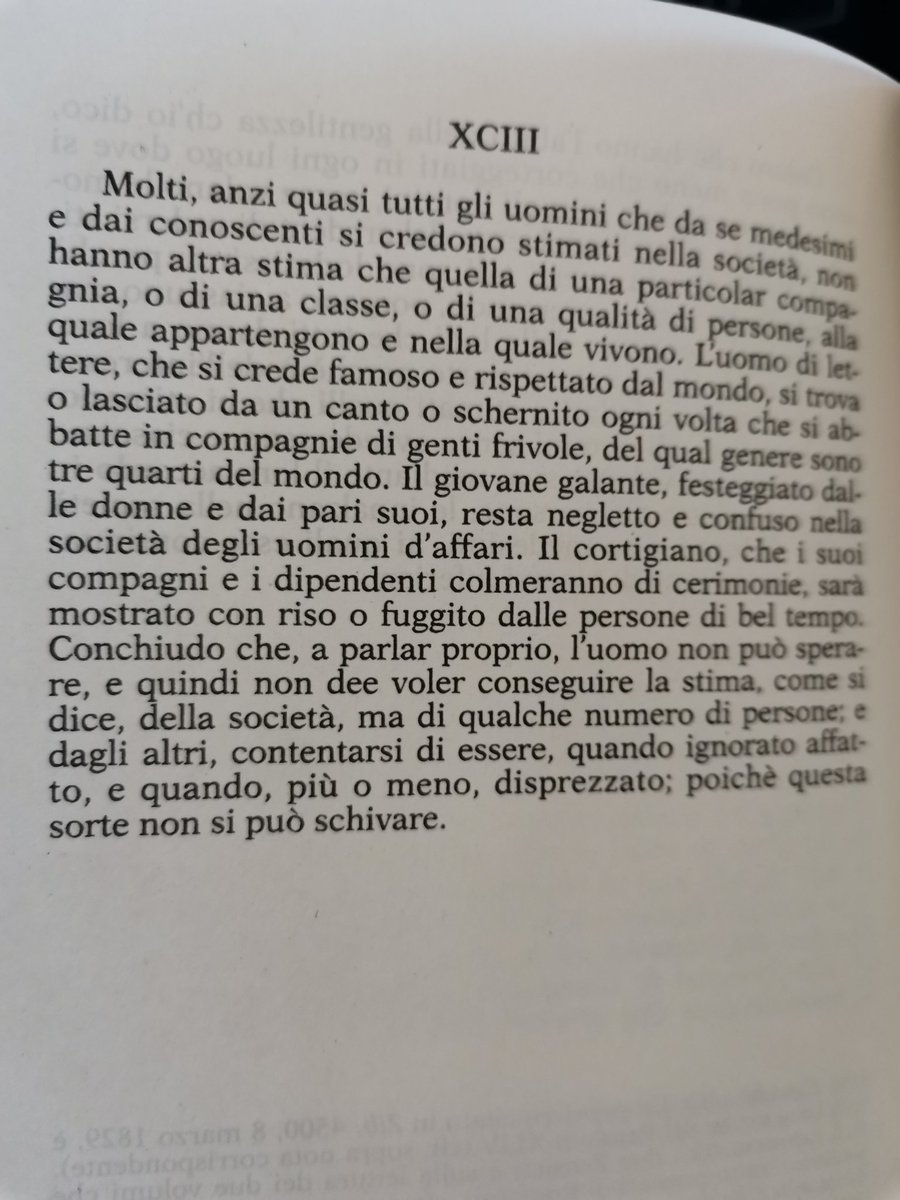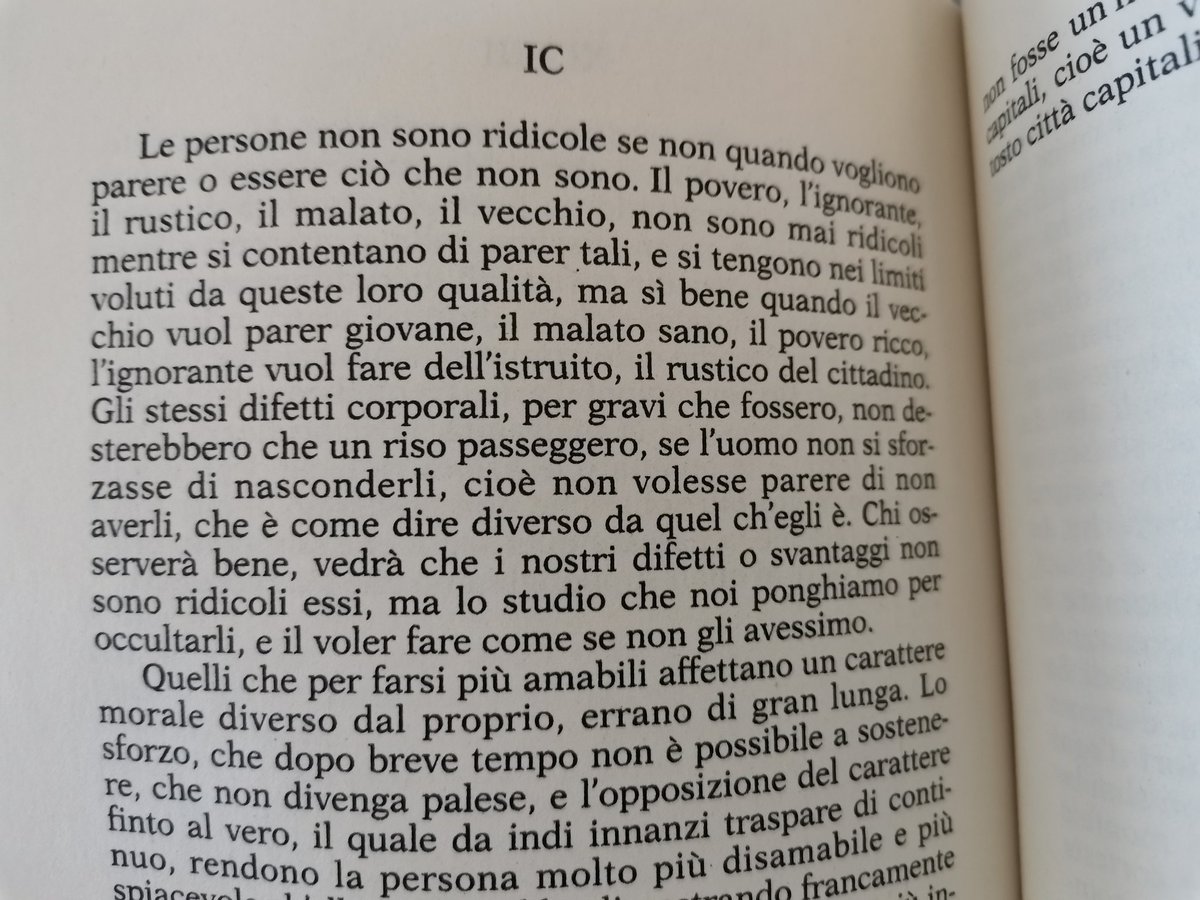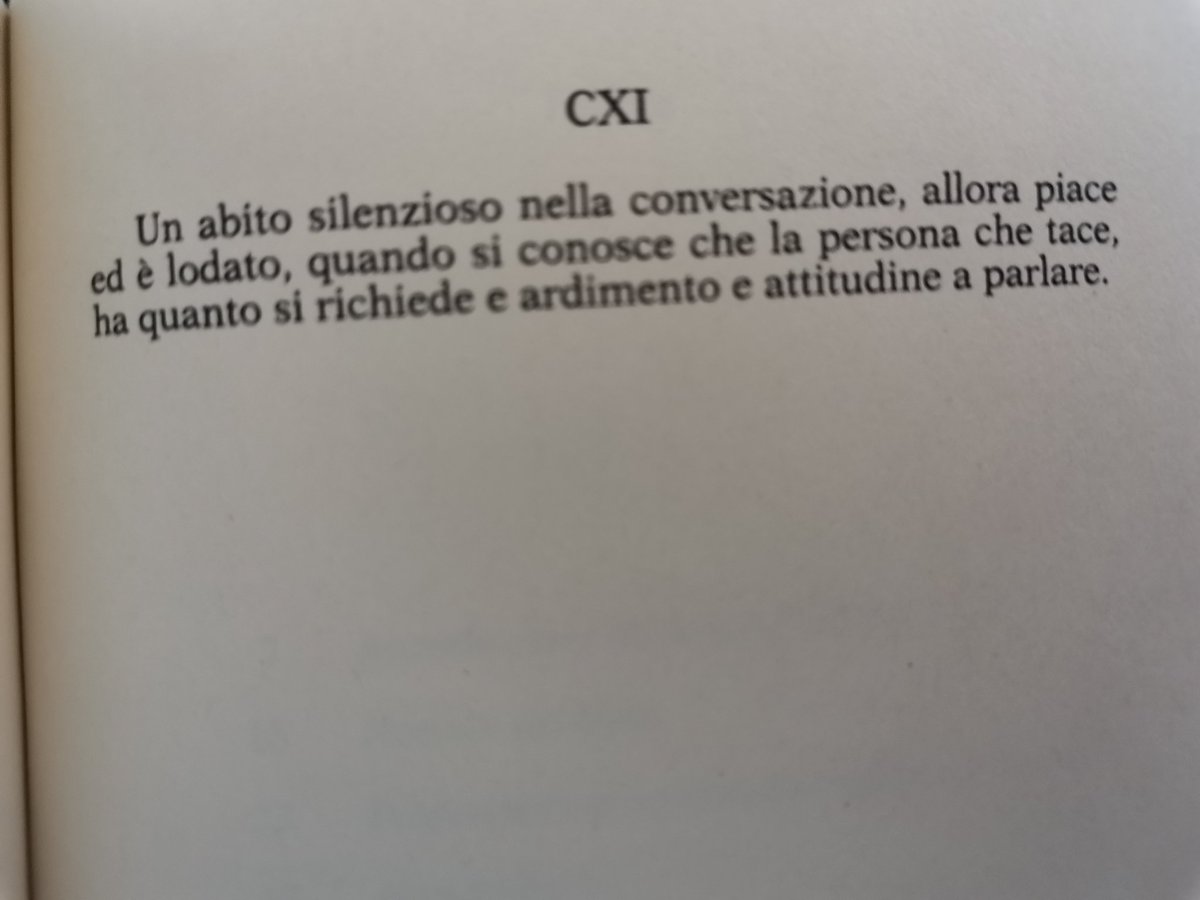First read of Leopardi. Born in Recanati (Marche) out of an aristocratic family, and with a Jesuit, classical education, he died in Naples at my age (39), possibly of cholera, but he also suffered rheumatism.
He wrote this "Pensieri" inspired by La Rochfoucauld's "Maximes".
1/n
He wrote this "Pensieri" inspired by La Rochfoucauld's "Maximes".
1/n
His "Thoughts" were unfinished when he died, they were a pretty disorganized manuscript, and several (different) different editions exist, although the main one (this) is the one compiled by his friend Ranieri, who seems to have been for Leopardi what Max Brod was to Kafka.
2/n – bei Park Hotel San Michele
2/n – bei Park Hotel San Michele
First thought: The world is divided between villains and honest people. Villains recognize themselves immediately, they respect each other and behave properly to one another but it is impossible for them to do this with honest people. Honest people people are too predictable.
3/n
3/n
One understands Leopardi is considered a pessimist...
Villains in poverty are rare, as they help each other, but sincere, honest people are often not when disgrace hits them as they are hated by "mankind, which hates not that who acts evil, but the ones who name it (evil)".
4/n – bei Park Hotel San Michele
Villains in poverty are rare, as they help each other, but sincere, honest people are often not when disgrace hits them as they are hated by "mankind, which hates not that who acts evil, but the ones who name it (evil)".
4/n – bei Park Hotel San Michele
Leopardi wrote in literary Italian, but he had in his letters high praise for his Recanatese dialect.
Third thought, written in the early 19th century: "The usage of this century is to publish a lot and read nothing".
5/n – bei Park Hotel San Michele
Third thought, written in the early 19th century: "The usage of this century is to publish a lot and read nothing".
5/n – bei Park Hotel San Michele
5th thought: "In hidden things it is always the smaller number who sees better, in the obvious ones, the larger. (...) Thus, it is foolish a d dangerous, and in the long term useless, to ask for the opinion of the larger number in civil matters."
6/n – bei Park Hotel San Michele
6/n – bei Park Hotel San Michele
6th thought: "Death is not bad, because it frees from all evil, and removes desire. Old age is the ultimate evil because it prevents man from enjoying pleasure but leaving him the appetites and pain. Nevertheless, men fear death and want to reach the old age."
7/n – bei Park Hotel San Michele
7/n – bei Park Hotel San Michele
17th thought: "Same as prisons and galleys are full of innocent people, public office and honours are bestowed to those reluctant to them. It's almost impossible to find anyone confessing (...) having desired such honours: but maybe the latter is less likely than the former."
8/n – bei Park Hotel San Michele
8/n – bei Park Hotel San Michele
20th thought: "If I had the wit of Cervantes I would write a book to purge, as he did in Spain to imitators of chevaliers, I would do in Italy (...) for a vice (...) not less barbaric and cruel (...). I am referring to the vice of reading to others one's own compositions."
9/n
9/n
25th thought: "Nobody is so disconnected from the world (...), that won't feel in part reconciled, as no one we know is so evil that when he greets us gallantly won't appear less evil than before. These observations proof man is weak, they don't justify evil nor the world."
10/n
10/n
27th tought: "There is not greater sign of not being a philosopher and not wise that wanting the whole life to be philosophical and wise."
Leopardi would have been an excellent Twitterati.
11/n
Leopardi would have been an excellent Twitterati.
11/n
28th thought: "Mankind is unique (...) in being divided into two parts: those who use arrogance and those who suffer it (...). Those who can choose, do choose. The truth is not all can, and not always."
12/n
12/n
30th thought: "Mankind tends to cheapen present goods and praise the past ones, similarly most travellers, as they travel, prefer they home country to that one where they are. But when they are back, they prefer with the same passion the places where they were to their own."
13/n – bei Spiaggia della Purità
13/n – bei Spiaggia della Purità
31st thought connects with an observation I did on Lindy: Leopardi thinks that every country thinks their women are vain, that money is king, that envy and hypocrisy are especially strong there, when these things are human, or universal @PaulSkallas.
14/n
https://twitter.com/NachoOliveras/status/1134823660588589062?s=19
14/n
https://twitter.com/NachoOliveras/status/1134823660588589062?s=19
35th tought: "In some places, like Naples (...) the man who is reputed as having no money is almost not considered a man; but if he has a reputation of having money his life is in danger (...). Then the usual practice (...) is to leave his financial situation a mystery..."
15/n
15/n
39th thought with my own added: Leopardi quotes Baldassar Castiglione as being right considering that for the old men, the past looks better just because they were younger. But he illustrates the point with a letter from Lorenzo Magliotti to a relative in 1683 saying that...
16/n – bei Masseria Sparivento
16/n – bei Masseria Sparivento
when his father was young, no one needed to put on winter clothes on Eastern, which was the case for him. Leopardi discounts this as symptomatic of Castiglione's point, considering impossible that climate changed...
In which Leopardi was wrong!
17/n https://qz.com/1554962/what-17th-centurys-little-ice-age-teaches-us-on-climate-change/
In which Leopardi was wrong!
17/n https://qz.com/1554962/what-17th-centurys-little-ice-age-teaches-us-on-climate-change/
Leopardi assumed also that climate changed, it could only change in one direction (increasingly freezing but not in the reverse).
Castiglione's point seems nevertheless to explain Leopardi's pessimism quite well, since Leopardi was rheumatic and never enjoyed much health.
18/n
Castiglione's point seems nevertheless to explain Leopardi's pessimism quite well, since Leopardi was rheumatic and never enjoyed much health.
18/n
44th thought: “Old politicians always talked about habits and virtue; the new ones, about trade and monetary policy(...). Economy students say that good habits cannot be without a foot on trade (...). Meanwhile, with trade we have greed, egoism (...) and we wait for virtue.”
19/n
19/n
46th thought: "(...) in almost all civil languages, modern and old, the same words express goodness and scarcity, a good man needs little. (...) no one having an option to choose chooses to be good, those having little are good because they can't be another thing.
20/n – bei Chiesa di Santa Maria degli Angeli
20/n – bei Chiesa di Santa Maria degli Angeli
47th thought: "Man is doomed to spend youth without a purpose, other than maturing and providing for oneself: or looking to procure joy for that part of the life in which the capacity for enjoyment will have vanished."
21/n – bei Chiesa di Santa Maria degli Angeli
21/n – bei Chiesa di Santa Maria degli Angeli
58th thought: “Those who are shy don’t have less self-respect than those who are arrogant, even they have more, or more sensitive, that is, this is why they won’t sting others (...) so that they will not be sting themselves, considering the extreme pain they receive then.”
23/n
23/n
60th thought is an asymmetry spotted by La Bruyere: "(...) it is easier for a mediocre book to get a name because of the reputation of the author that for an author to get a reputation because of an excellent book. (...) the easier way to get famous is saying one is famous".
24/n
24/n
66th thought: "In this century blacks are thought as a different race (...) yet equal in human rights. In the 16th century, Blacks were thought by Spanish theologians to stem from the same family as whites but inferiors in their rights by God's will. (...) Both sold Blacks."
25/n – bei A Brasileira
25/n – bei A Brasileira
68th thought: "Boredom is, in a way, the most sublime human feeling. (...) 'Ennui' seems to me the clearer sign of greatness and nobility: this is why it is so rare in mankind, at any point of time, and barely exists among other animals."
26/n
26/n
74th thought: "Towards great men, and especially those of an extraordinary virility, the world is like a woman. Not only they are admired, but they are loved: because that kind of force inspires. love. (...) Thus Napoleon was very much loved in France, even by the soldiers."
27/n
27/n
77th thought connects with some thought shared with @PaulSkallas on the salubrity of big cities during covid: "(...) London, Madrid and similar cities offer poor conditions for a health, but since they are capitals, they grow from healthy provinces".
https://twitter.com/NachoOliveras/status/1264251613411192833?s=19
28/n
https://twitter.com/NachoOliveras/status/1264251613411192833?s=19
28/n
81st thought: "It happens in conversations as much as with writers (...) reading first some new ideas, they please us greatly, we keep reading and get boring, as a part of their writing is a copy of the other. (...) When men do not imitate others, they imitate themselves."
29/n
29/n
84th tought: "Jesus was the first to note men as worshippers and receivers of fake virtues. (...) slaves of the strong, tyrants of the weak (...): this was what Jesus described as the world (...) There is so much true into that as I have ever read in a secular philosopher."
30/n
30/n
86th thought is a real wisdom pearl @paulportesi: "The safest way to conceal to the others the limits of your own knowledge is not trespassing them."
31/n
31/n
87th thought: "That who travels a lot has this advantage over other people that his memories soon become remote, and thus become shortly poetic, that the others can only achieve through time. The advantage of the not-traveled is that all their memories are in the present..."
32/n
32/n
89th thought: "Those who seldom treat men are rarely misanthropic. True misanthropes are not alone because it is the practical side of life which makes men hateful, not philosophy. If one such misanthrope retires from society, he looses in his retirement his misanthropy."
33/n
33/n
93rd thought: "Many, even almost all men that think are respected, actually are so by a particular kind of people only, the one they belong. (...) Man cannot expect to be respected by society but by a certain number of people, and ignored or more or less despised by others."
34/n
34/n
99th thought: "People are not ridiculous if they don't pretend being what they are not. The poor, the ignorant, the peasant, the sick, the old are not ridiculous if they accept to be such (...) but only when they pretend to appear young, or a sick man fit, or a poor, rich."
35/n
35/n
111th and final thought by Leopardi: "A quiet disposition in a conversation is pleasing and praised when we know that the quiet person has the guts and the attitude to speak out."
36/36 – bei Lisboa E Linda
36/36 – bei Lisboa E Linda

 Read on Twitter
Read on Twitter